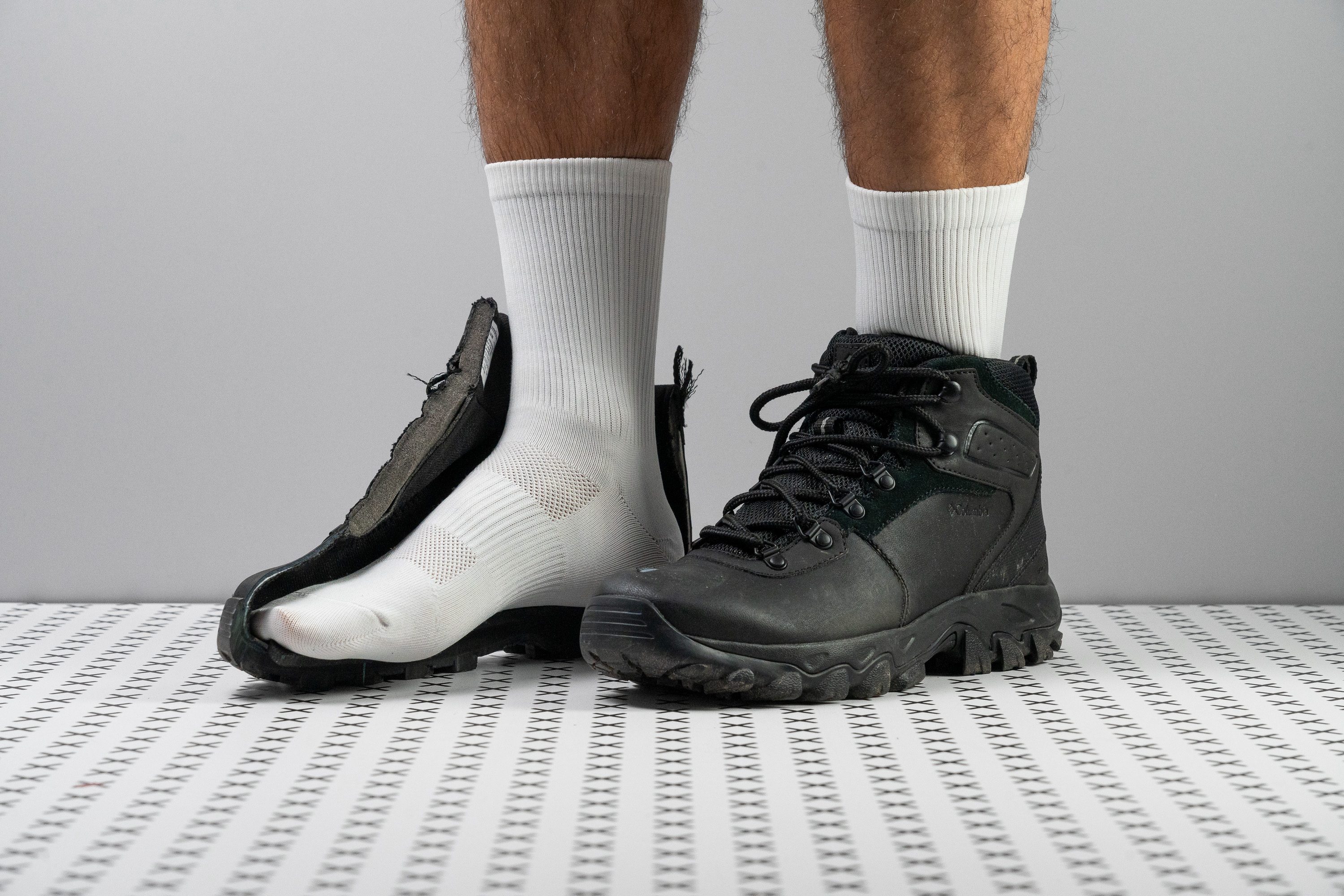Our verdict
- Top pick in best leather hiking boots
- Top pick in best cheap hiking boots
Pros
- Comfortable step-in feel
- Lightweight construction
- Affordable price point
- Lively and responsive ride
- Stable and grounded base
- Flexible forefoot
Cons
- Ineffective waterproofing
- Not much ankle support
- Not very durable
Audience verdict
- Top 25% most popular hiking boots
Comparison
The most similar hiking boots compared
+ + Add a shoe | |||||
|---|---|---|---|---|---|
| Audience score | 84 Good! | 79 Decent! | 83 Good! | 85 Great! | |
| Price | $100 | $195 | $170 | $170 | |
| Trail terrain | LightModerate | LightModerate | Moderate | Moderate | |
| Shock absorption | Moderate | High | Moderate | - | |
| Energy return | High | Moderate | Moderate | - | |
| Weight lab Weight brand | 16.5 oz / 468g 15.9 oz / 452g | 17.4 oz / 494g 18 oz / 510g | 17.5 oz / 495g 13.6 oz / 385g | 18.2 oz / 515g 17.4 oz / 493g | |
| Lightweight | ✓ | ✓ | ✓ | ✗ | |
| Breathability | Warm | Warm | Warm | Warm | |
| Use | Day HikingLight HikingUrban hikingSnowBeginners | Day HikingSpeed HikingLight HikingSnow | Day HikingLight HikingSnow | BackpackingDay HikingLight Hiking | |
| Orthotic friendly | ✓ | ✓ | ✓ | ✓ | |
| Drop lab | 9.8 mm | 9.0 mm | 13.5 mm | 12.9 mm | |
| Size | True to size | True to size | Half size small | True to size | |
| Midsole softness | Firm | Balanced | Firm | Firm | |
| Difference in midsole softness in cold | Normal | Normal | Small | Small | |
| Heel counter stiffness | Flexible | Flexible | Moderate | Flexible | |
| Stiffness | Flexible | Moderate | Moderate | Moderate | |
| Outsole hardness | Soft | Average | Average | Soft | |
| Waterproofing | Waterproof | Waterproof | Waterproof | Waterproof | |
| Material | LeatherMeshSuede | LeatherTextile | MeshSuede | Leather | |
| Season | Winter | Winter | Winter | Winter | |
| Toebox durability | Decent | Bad | Bad | Good | |
| Heel padding durability | Bad | Bad | Good | Decent | |
| Outsole durability | Bad | Decent | Bad | Bad | |
| Width / fit | Medium | Medium | Medium | Wide | |
| Toebox width | Narrow | Narrow | Medium | Wide | |
| Lug depth | 4.7 mm | 5.0 mm | 5.0 mm | 4.2 mm | |
| Heel stack lab | 33.7 mm | 34.4 mm | 36.1 mm | 31.1 mm | |
| Forefoot | 23.9 mm | 25.4 mm | 22.6 mm | 18.2 mm | |
| Widths available | NormalWide | NormalWide | NormalWide | NormalWide | |
| Technology | - | Gore-TexVibram | Gore-Tex | Ortholite | |
| Cut | Mid cut | Mid cut | Mid cut | Mid cut | |
| Removable insole | ✓ | ✓ | ✓ | ✓ | |
| Ranking | #27 Bottom 34% | #38 Bottom 7% | #30 Bottom 26% | #24 Bottom 41% | |
| Popularity | #10 Top 25% | #12 Top 30% | #11 Top 27% | #30 Bottom 26% |
Who should buy
The Newton Ridge Plus II WP is worth your attention if:
- you need a more affordable option
- you are an entry-level or recreational hiker who doesn't need a very technical boot just yet
- you want a versatile outdoorsy boot for urban use, hiking, and yardwork
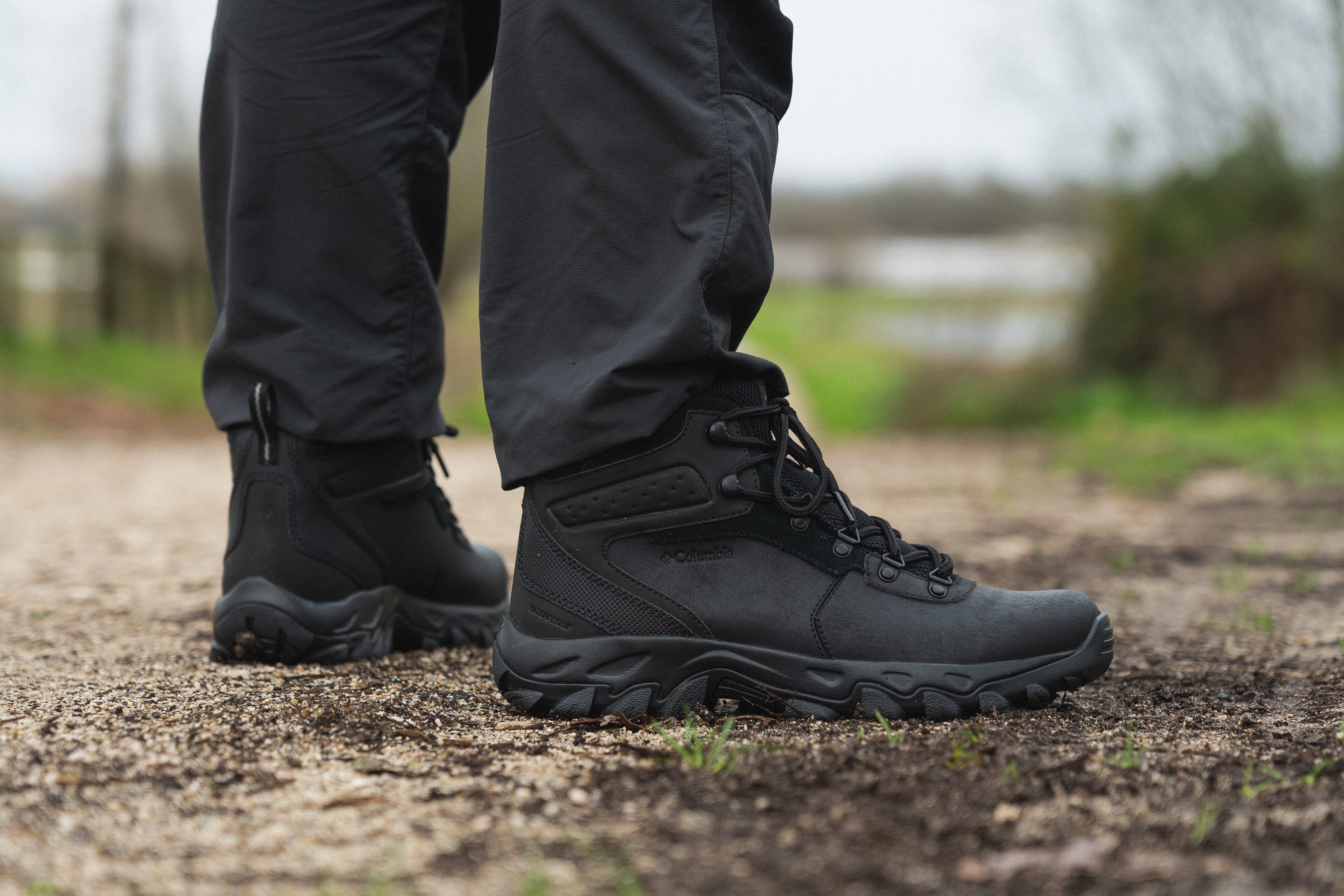
Who should NOT buy
Despite being very popular, this Columbia boot is not the best bet for:
- long hikes or multi-day backpacking trips
- technical terrain and challenging hikes
- downpours and harsh winter conditions
You will need more rugged and better-equipped footwear for the aforementioned use cases. That also means more expensive options like the Merrell Moab 3 Mid GTX or the Salomon X Ultra 4 Mid GTX.
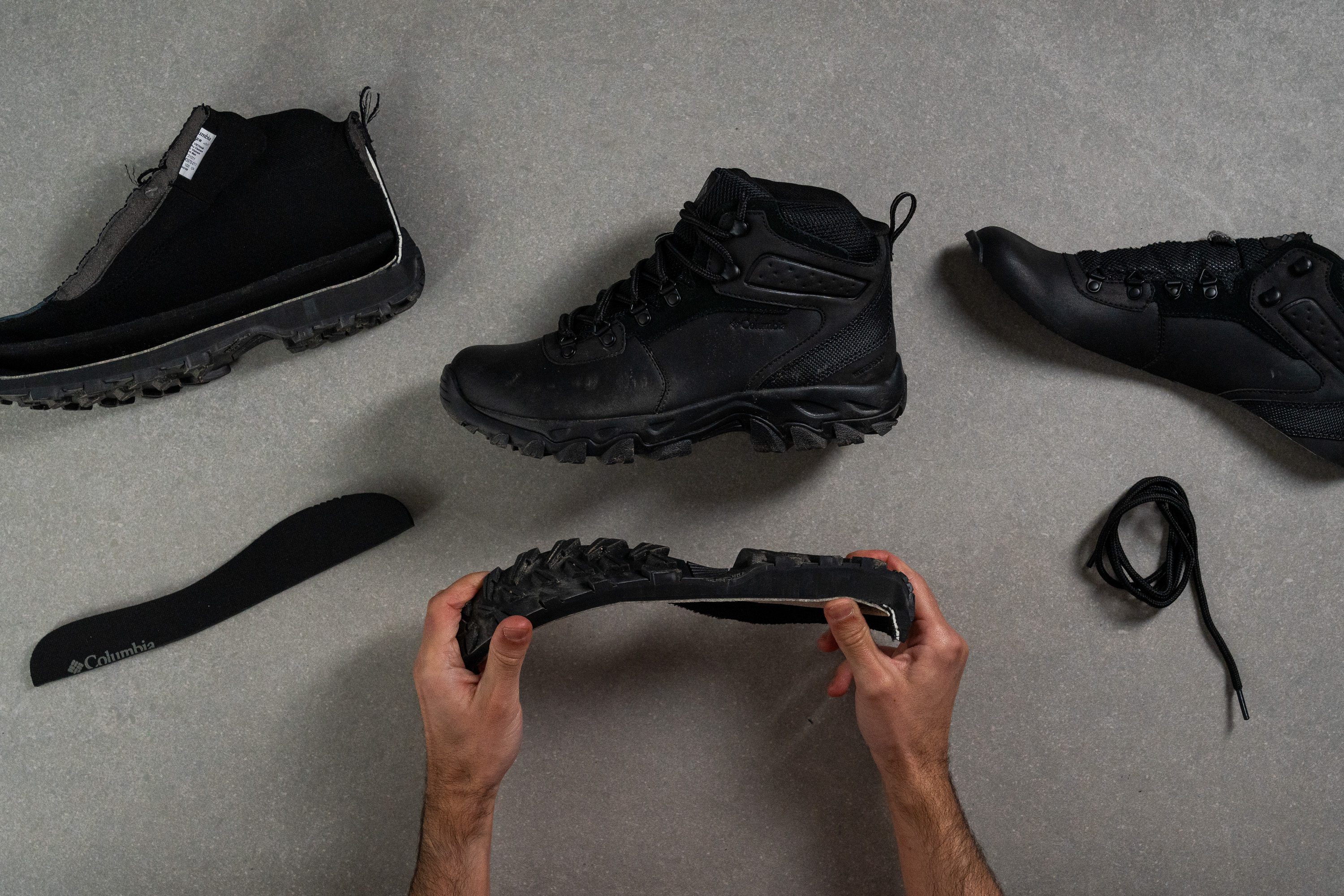
Cushioning
Shock absorption
According to Columbia's product specs, the Newton Ridge Plus II WP belongs to their "light cushioning" category which means that the midsole is minimally cushioned and feels close to the ground.
This is indeed reflected in the boot's moderate shock absorption measurement of 91 SA, which doesn't provide a ton of impact protection for shuttling a heavy backpack over long distances.
That's why the boot is primarily recommended for urban use and light hiking.
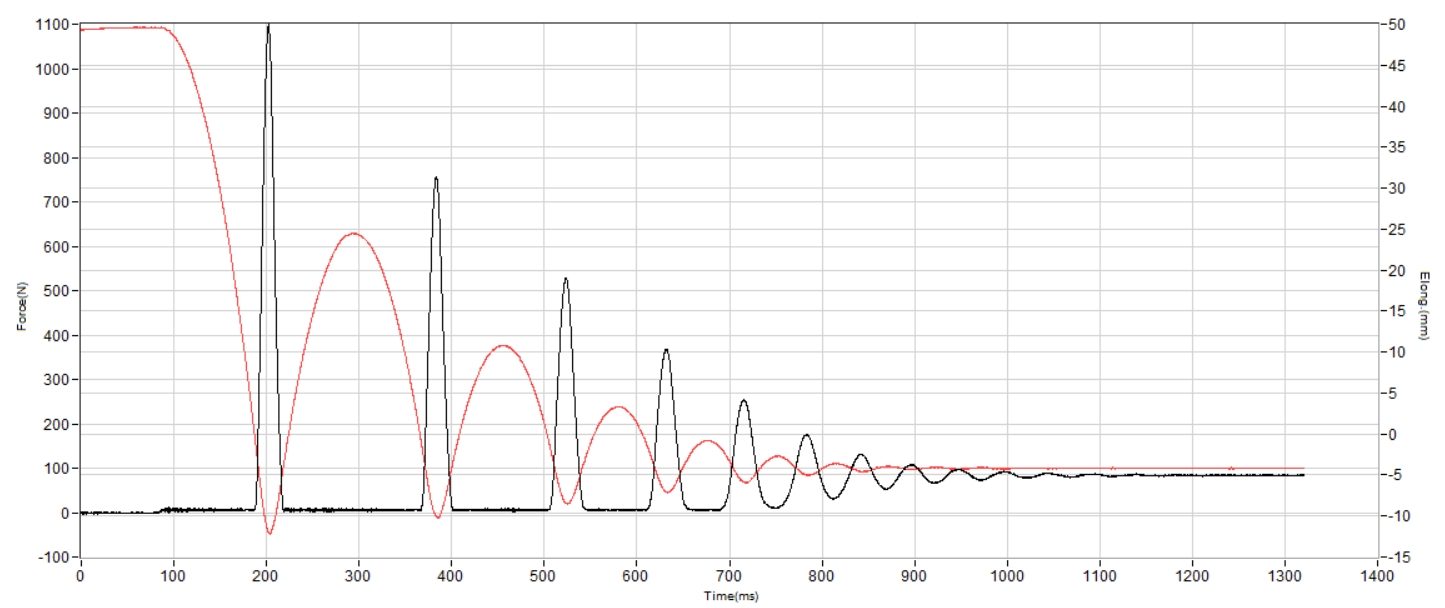
| Newton Ridge Plus II Waterproof | 91 SA |
| Average | 93 SA |
Energy return
But you do get a fairly lively ride in this Columbia boot. Its above-average energy return of 56% makes it feel a lot like a bouncy sneaker underfoot.
| Newton Ridge Plus II Waterproof | 56.0% |
| Average | 50.5% |
Heel stack
Having cut the boot in half, we measured its stack height with a caliper and found that it's not much thinner than the average hiking boot in our catalog.
At 33.7 mm, its heel stack is merely 2-3 mm lower than the category average and offers decent impact protection for several hours of walking and hiking.
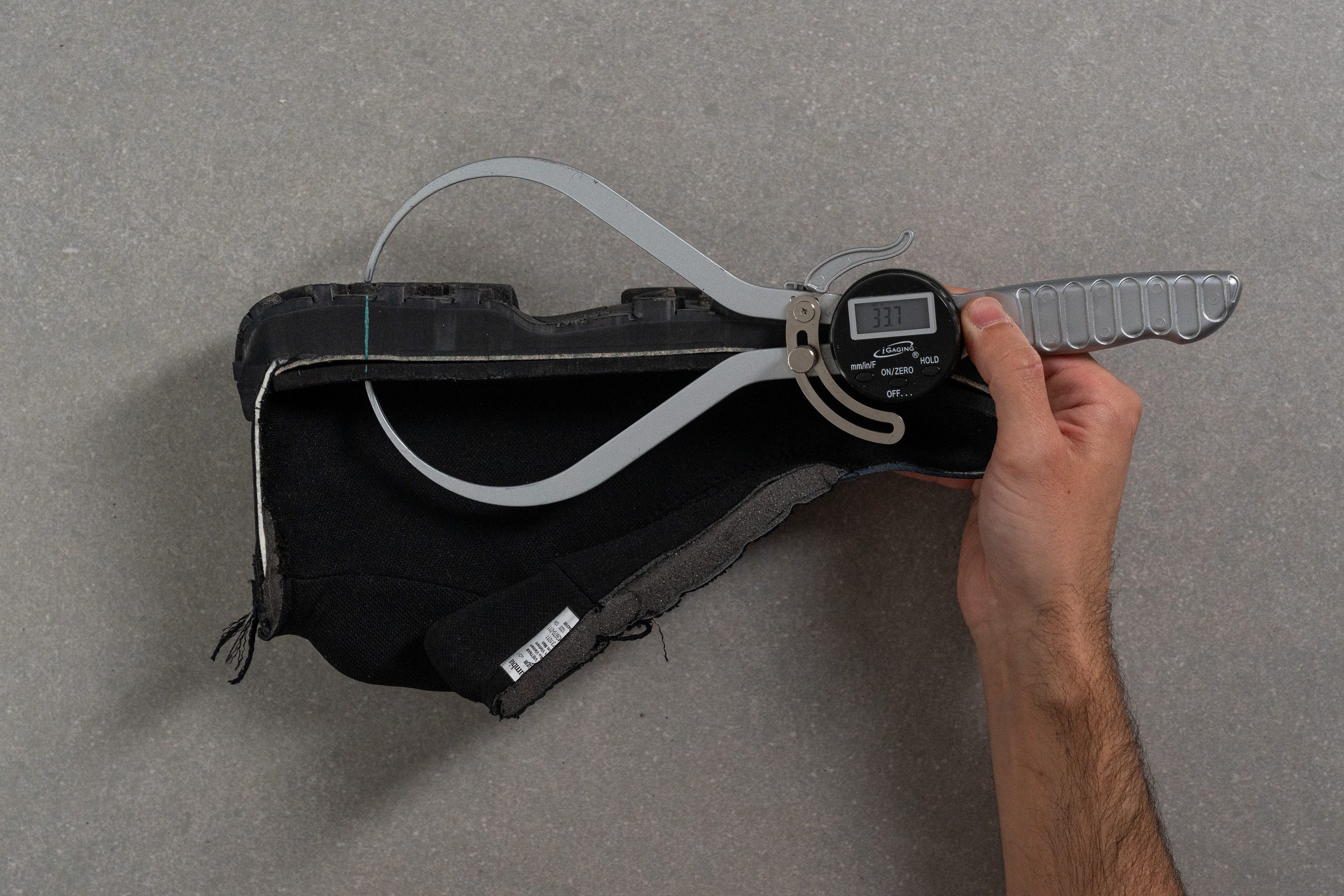
| Newton Ridge Plus II Waterproof | 33.7 mm |
| Average | 36.3 mm |
Forefoot stack
Measuring the boot's forefoot stack, we also got a higher-than-expected reading of 23.9 mm.
For reference, this is notably thicker than another popular boot from Columbia - the Fairbanks Mid (30.9 mm heel/ 19.4 mm forefoot).
We had to point that out because the brand's description may lead some people to think that the Newton Ridge is a minimalist type of boot.
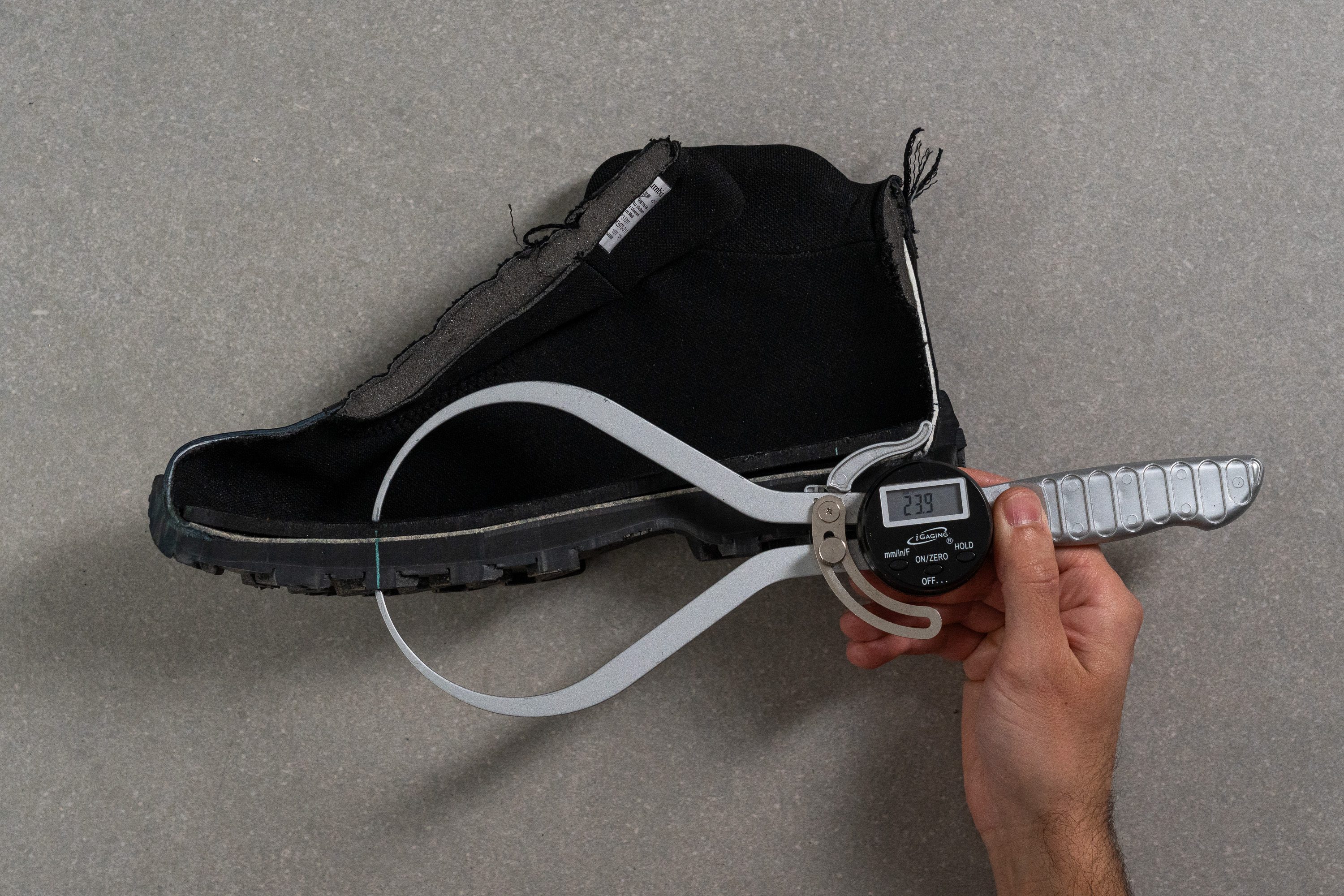
| Newton Ridge Plus II Waterproof | 23.9 mm |
| Average | 23.0 mm |
Drop
But it does feel fairly grounded thanks to its firm midsole and a moderate heel-to-toe drop of 9.8 mm.
This offset creates a pretty balanced foot placement where the heel sits neither too high (which is common for backpacking boots) not too low to strain the Achilles tendon.
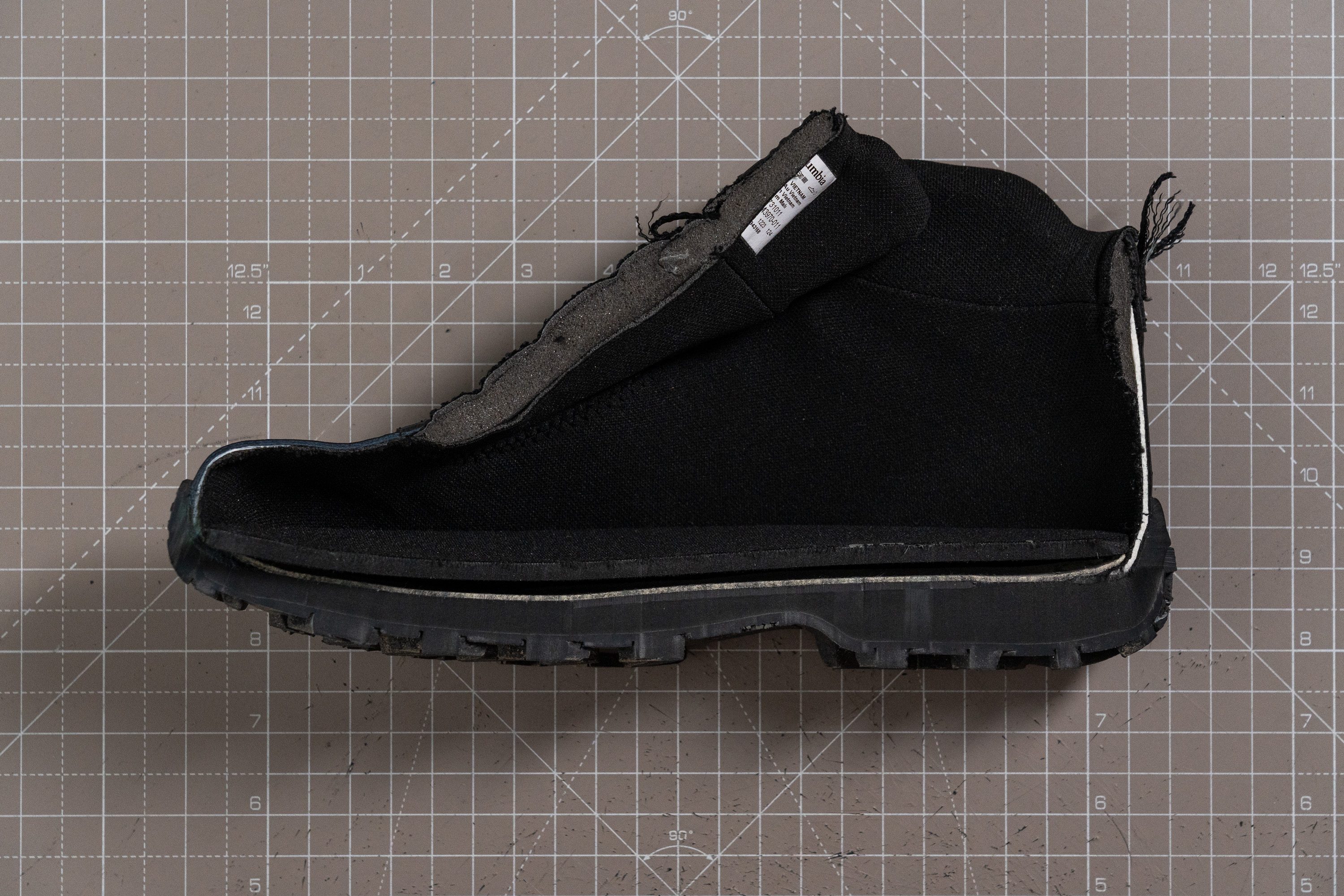
| Newton Ridge Plus II Waterproof | 9.8 mm |
| Average | 13.3 mm |
Midsole softness
Just like many other boots from Columbia, the Newton Ridge Plus II employs the brand's most common Techlite foam. It feels like a regular EVA blend but it stands out as a notably lightweight material (more on that in the Weight section).
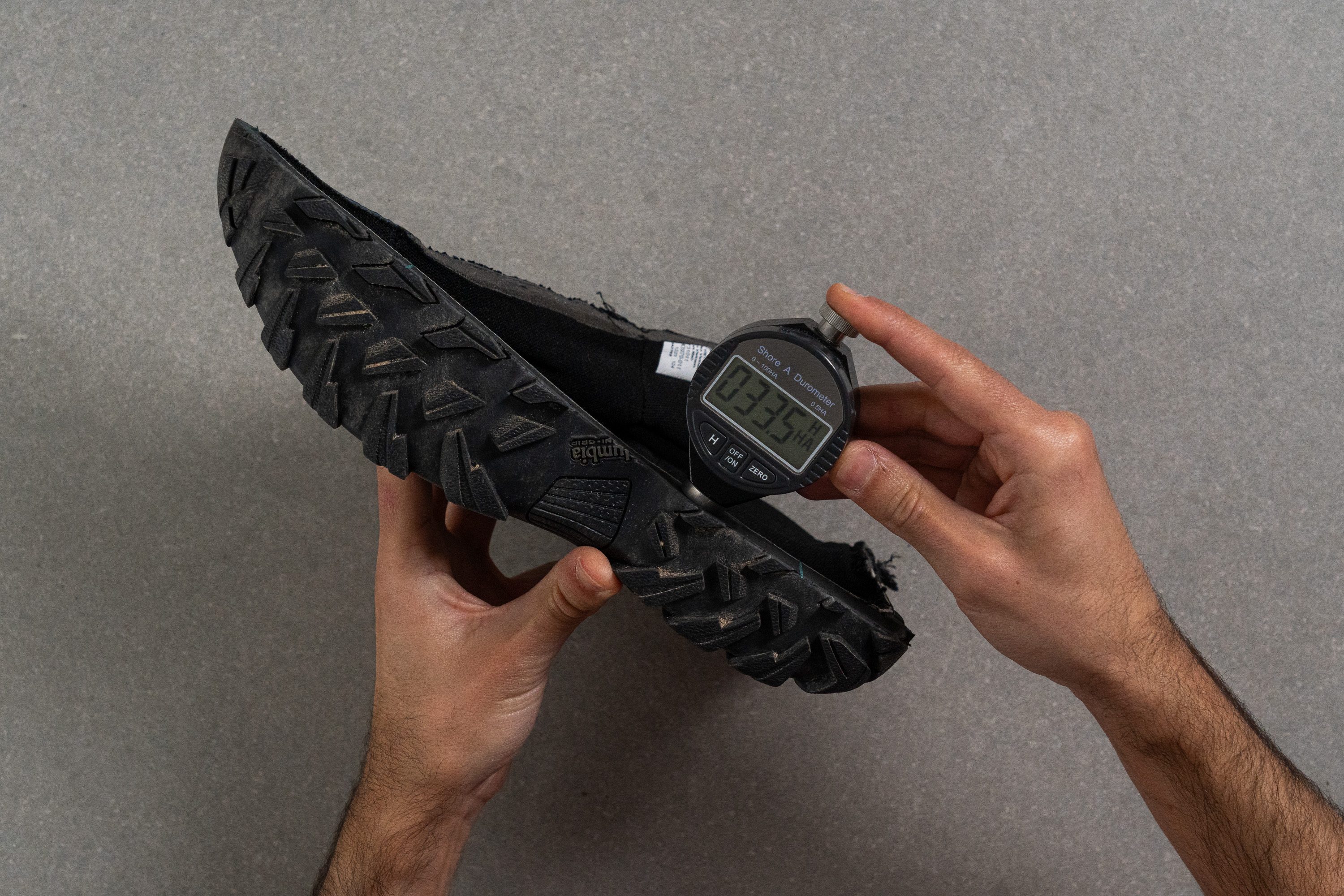
Measuring its softness with a Shore A durometer, we got a reading of 33.5 HA which is firmer than many other hiking boots we've tested, including other options from Columbia.
It makes the boot more stable and grounded but detracts from the comfort for all-day walks and hikes.
| Newton Ridge Plus II Waterproof | 33.5 HA |
| Average | 28.4 HA |
Size and fit
Size
Columbia Newton Ridge Plus II Waterproof fits true to size (222 votes).
Width / Fit
The Columbia Newton Ridge Plus II WP felt rather close-fitting in our regular size (men's US 9) and width (D medium). So once the boot's gel mold solidified, we grabbed a caliper to find out why.
The tool showed 92.6 mm in the widest part of the mold (the area between the first and fifth metatarsals) which is slightly narrower than average.
We believe that hikers with medium-width feet won't have any issues with this width but those with wider feet can benefit from the wide version of this boot.
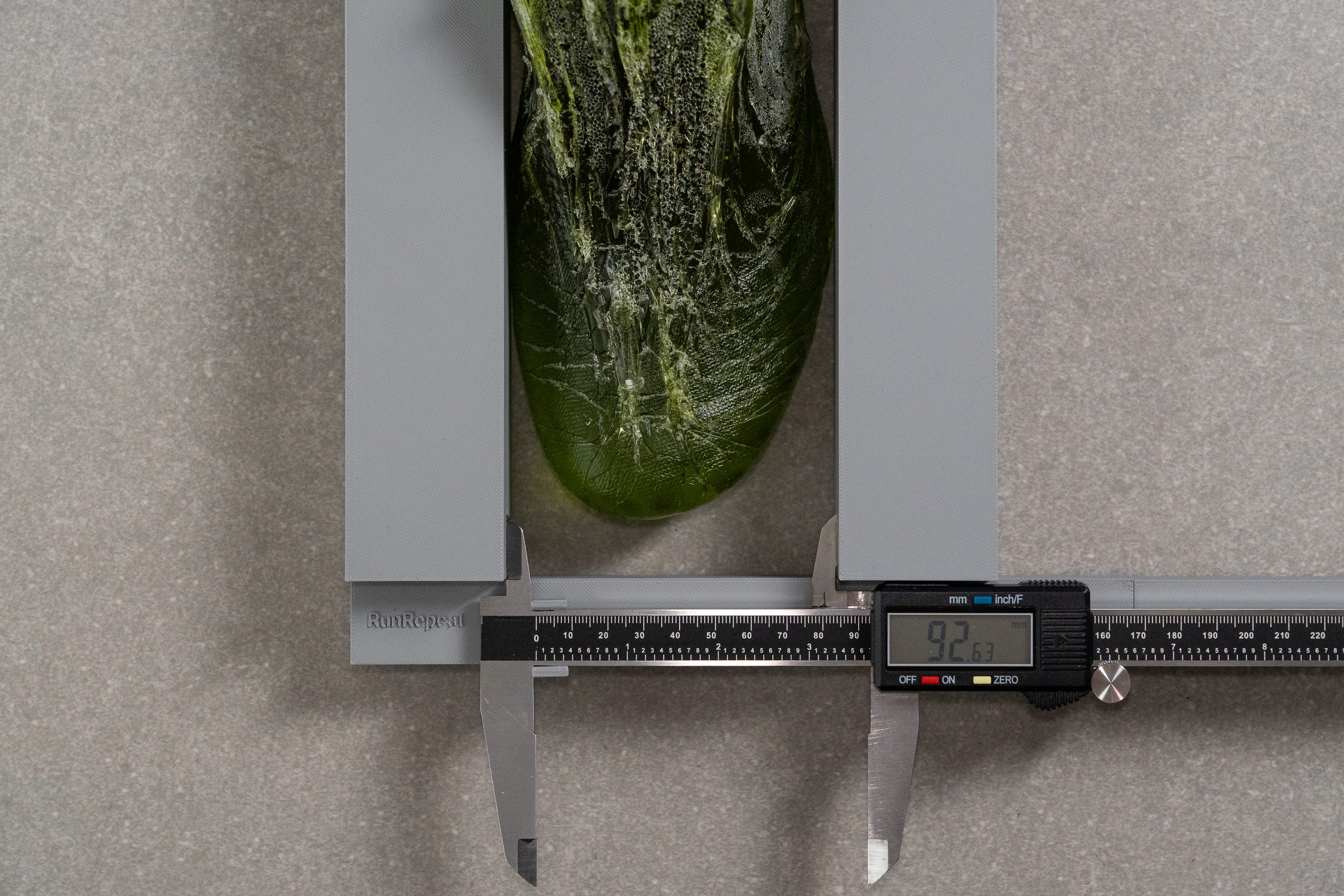
| Newton Ridge Plus II Waterproof | 92.6 mm |
| Average | 93.8 mm |
Toebox width
We also measured the mold's width closer to the front (near the big toe) in order to compare its toebox width to other hiking boots.
With a caliper reading of 69.8 mm, the Newton Ridge turned out to have a more pointy forefoot, which explains the snugness we experienced during the wear test. However, it's not critically tight for a medium foot shape and is also optimal for hikers with narrower feet.
But if you have bunions or wide feet, do opt for the wide version for extra space. Don't rely on a break-in period to loosen up the fit because the boot's leather has zero give to it.
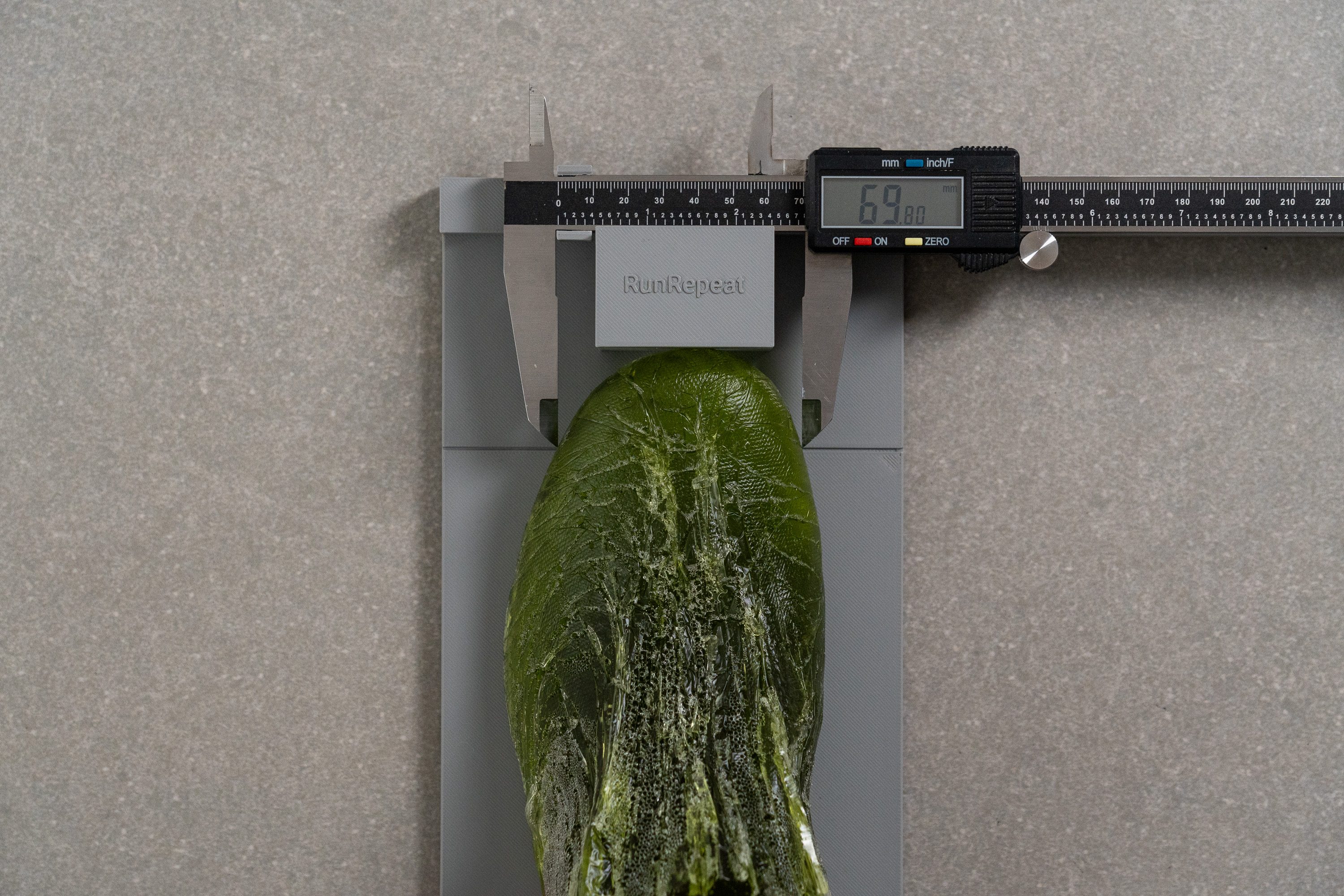
| Newton Ridge Plus II Waterproof | 69.8 mm |
| Average | 71.2 mm |
Toebox height
The boot offers decent vertical space with a toebox height of 26.3 mm. It felt adequate despite being 2 mm lower than average.
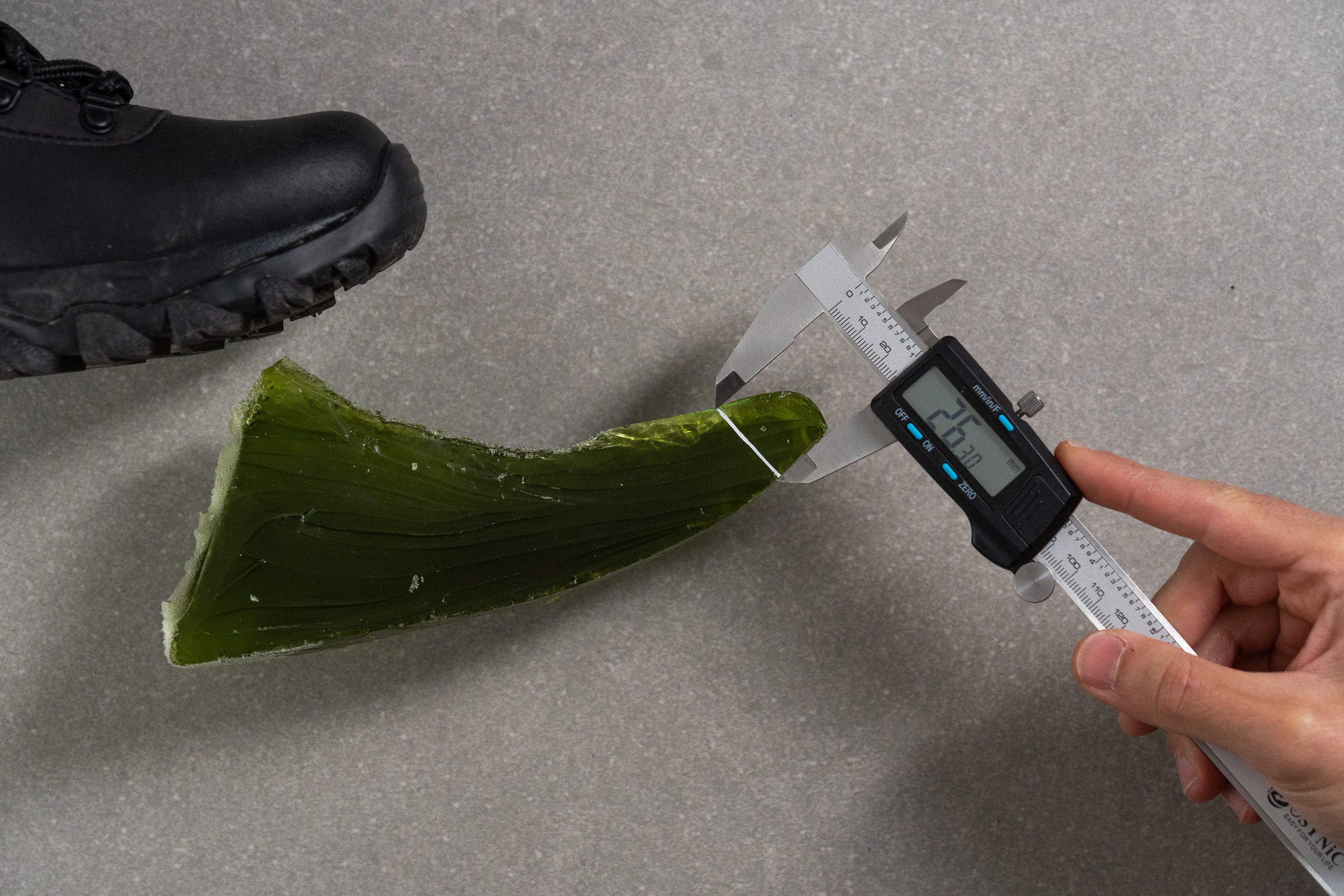
| Newton Ridge Plus II Waterproof | 26.3 mm |
| Average | 27.4 mm |
Traction / Grip
Lug depth
The Newton Ridge features Columbia's proprietary Omni-Grip outsole with rather deep 4.7 mm lugs, based on our caliper measurements.
The boot's tread pattern is claimed to adapt to varied surfaces and we found it to be mostly true. It kept us pretty confident on moss-covered logs, loose rocks, and creek beds. However, its treading is not ideal for extra muddy terrain because it doesn't shed the dirt so easily. We also lacked some braking power on steep descents.
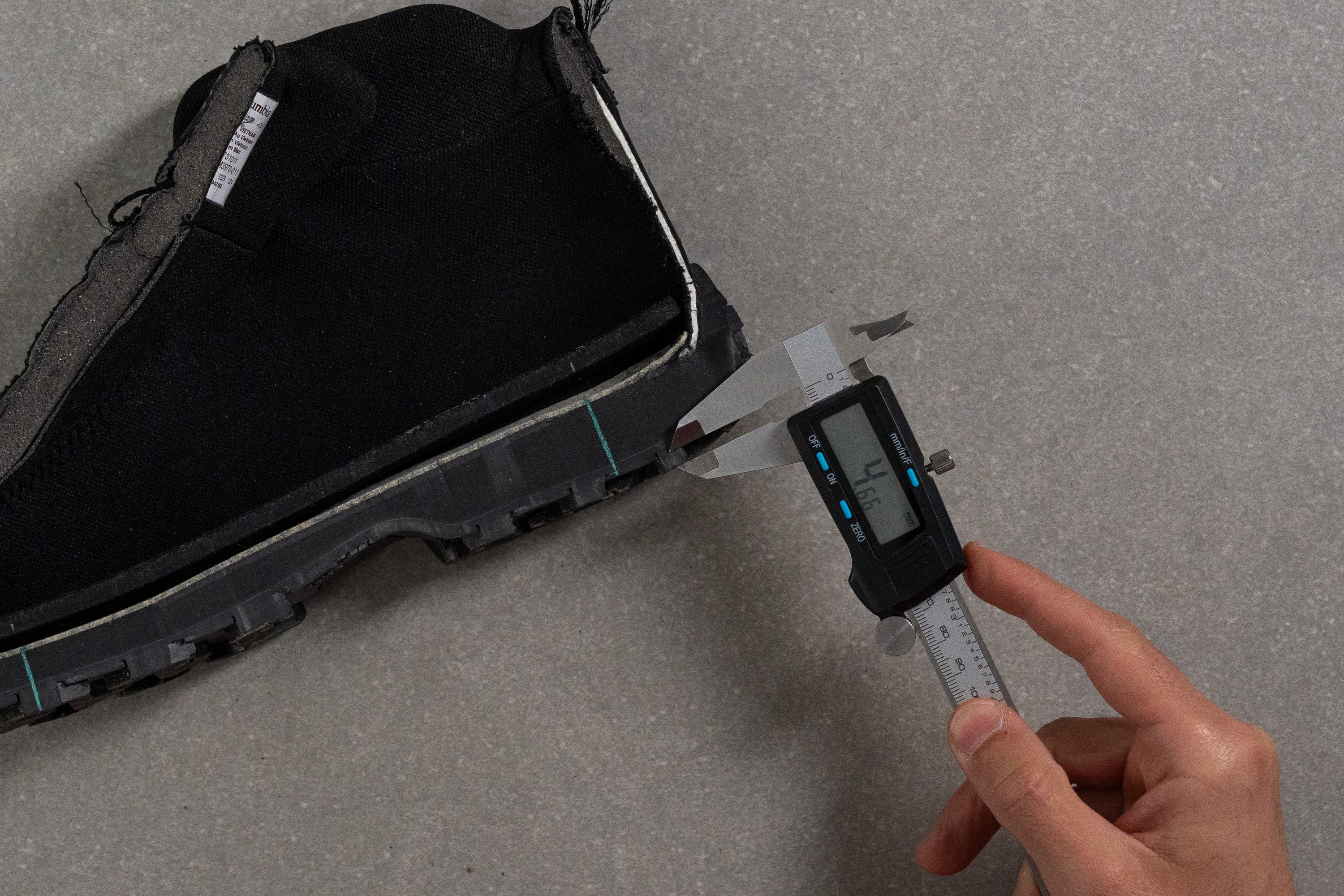
| Newton Ridge Plus II Waterproof | 4.7 mm |
| Average | 4.3 mm |
Flexibility / Stiffness
Despite its leather upper and firm platform, the Newton Ridge bends much easier than a typical hiking boot.
To put a number on it, we used a shoe flexing tester to measure the amount of force it takes to bend the boot to a 30-degree angle. The machine returned 20.7N which is notably less than it takes on average.
This is yet another confirmation that this Columbia silhouette is more oriented towards comfort and recreation rather than long-distance performance.
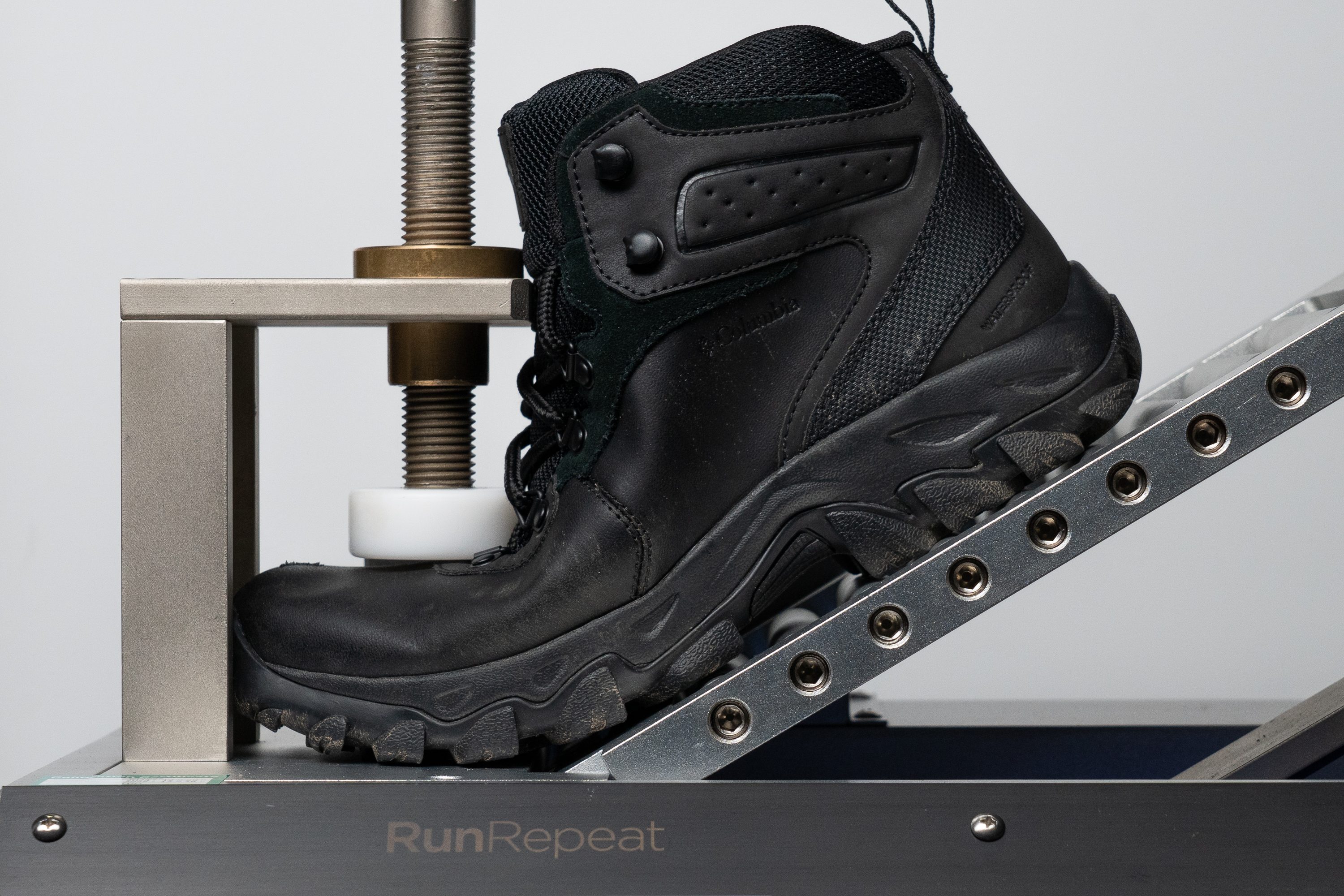
| Newton Ridge Plus II Waterproof | 20.7N |
| Average | 31.5N |
Stiffness in cold (%)
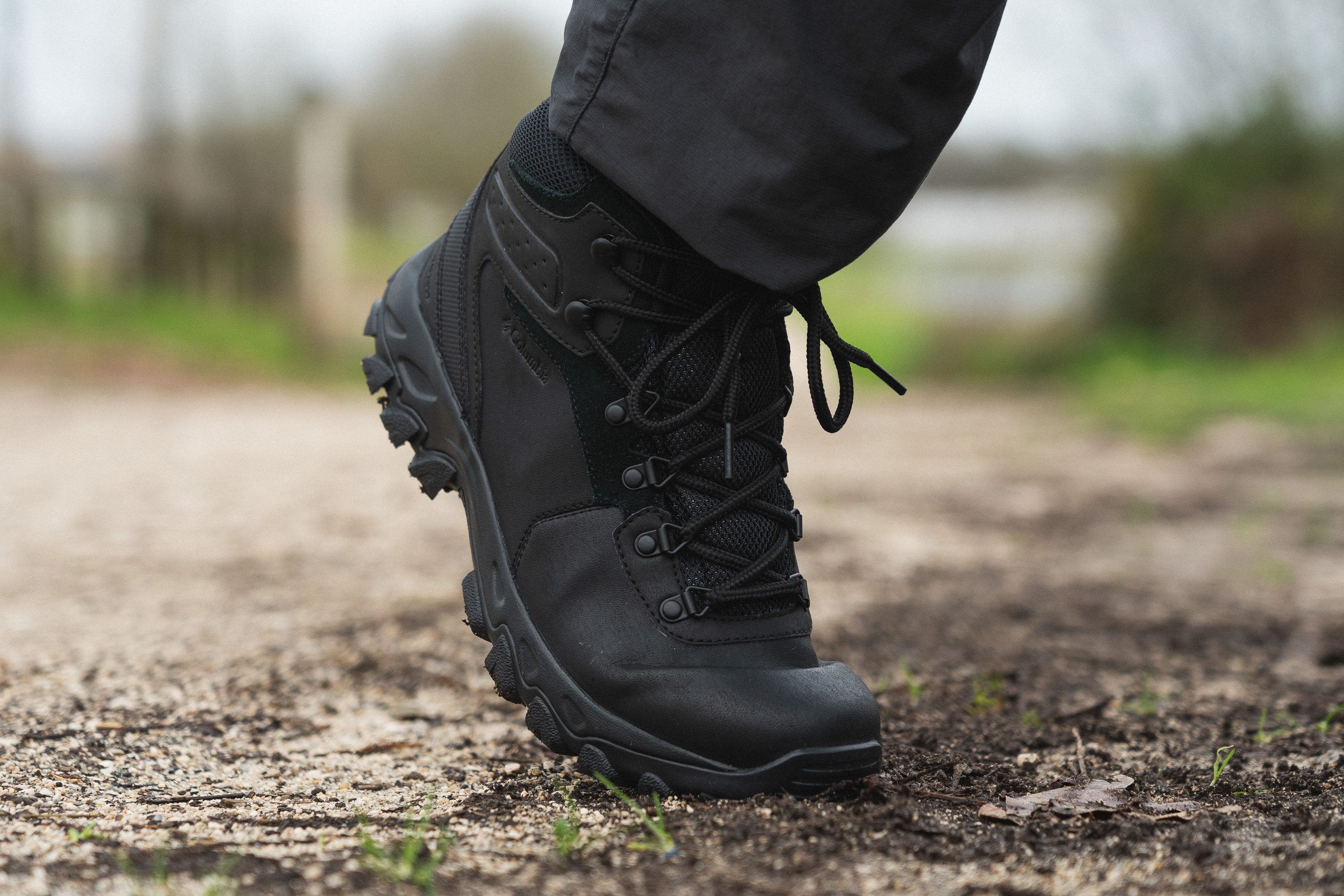
Weight
Devoid of bulk and unnecessary features, the Newton Ridge Plus II WP happens to be lighter than average by 2.5 oz.
Weighing the boot in a men's US size 9, our scale showed a comparatively low reading of 16.5 oz (468g) but not as low as stated by the brand - 15.9 oz (452g).
On the hike, however, it felt very easy and non-taxing on the legs. Even lighter than its static weight suggests.
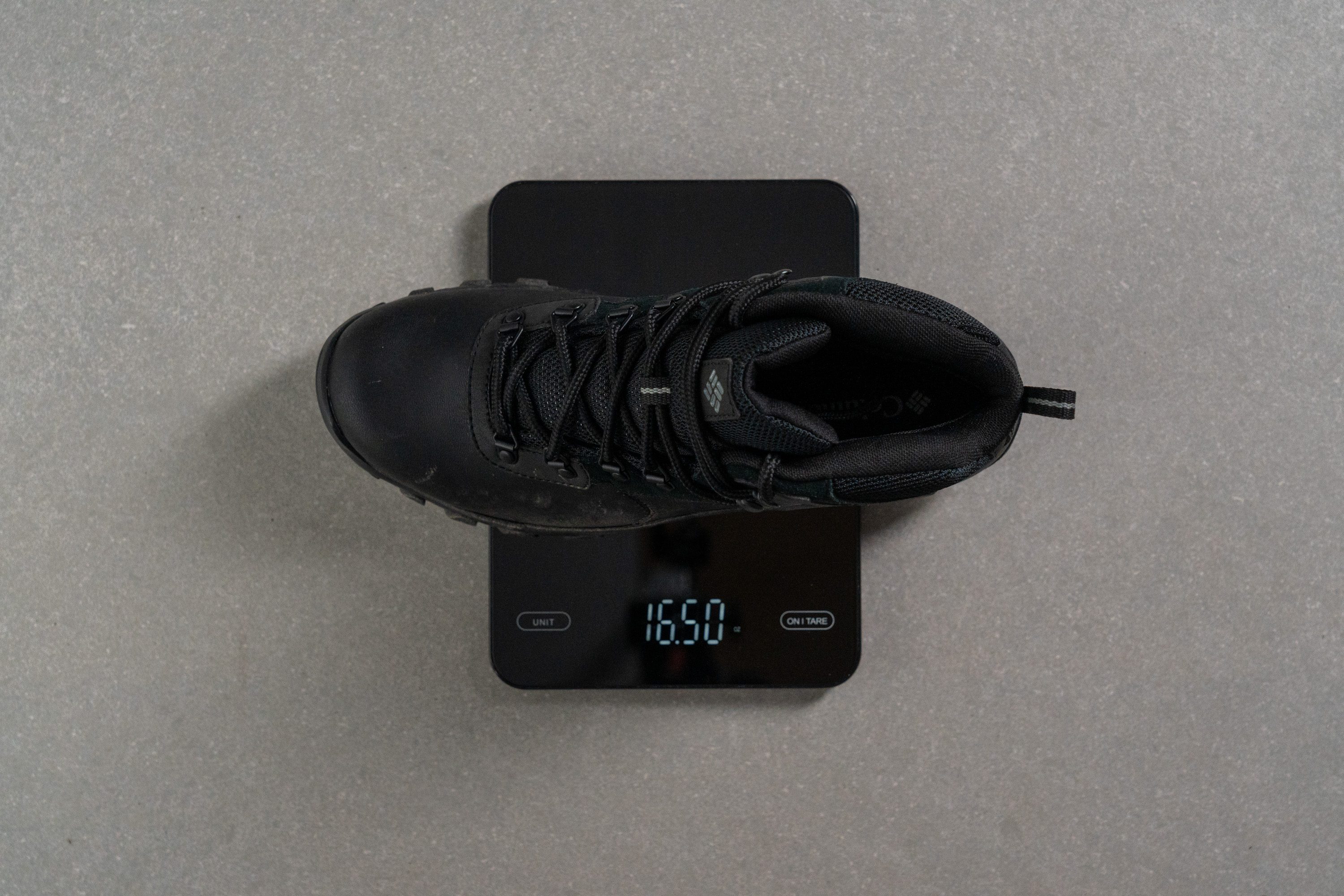
| Newton Ridge Plus II Waterproof | 16.5 oz (468g) |
| Average | 18.7 oz (531g) |
Breathability
Even though the Newton Ridge is lined with Omni-Tech (Columbia's proprietary waterproofing), it's not equally effective throughout the boot.
During our wear tests, we couldn't help but notice that the tongue kept holding on to moisture instead of pushing it away! So when we took it to the lab for in-depth breathablity tests, all the puzzle pieces fell into place.
We noticed a streak of smoke passing through the seam at the base of the tongue which never happens in 100% waterproof hiking boots.
Because of that, the Columbia Newton Ridge gets a slightly higher breathability score of 2 out of 5.
| Newton Ridge Plus II Waterproof | 1 |
| Average | 1.3 |
Waterproofing
Looks like we have some bad news in the waterproofing department as the Newton Ridge is only capable of handing shallow puddles, minor drizzles, and occasional splashes.
It's better to avoid major water exposure if you want to keep your feet nice and dry in this Columbia boot.
Stability
Lateral stability test
Designed for very moderate hikes and casual use, the Newton Ridge Plus II WP lacks the technical stability elements of the more advanced outdoor boots.
But given its fairly simple construction, this Columbia boot offers decent lateral support for moderate terrain and lighter backpacks.
Torsional rigidity
The boot's firm platform and thick leather upper work together to generate some solid twist-proofing in the midfoot.
In our manual test, we rated the Newton Ridge's torsional rigidty with a high score of 4 (5 being the stiffest). This translates to a pretty supportive and confidence-inspiring underfoot experience on the trail.
| Newton Ridge Plus II Waterproof | 4 |
| Average | 4.4 |
Heel counter stiffness
On the flip side, we wouldn't recommend this Columbia boot to hikers who:
- have moderate-to-severe overpronation
- carry heavy backpacks (30+ kg) on challenging/uneven terrain
That's because the ankle support is very minimal in the Newton Ridge Plus II WP.
Its entire rearfoot (both the heel counter and the ankle collar) are too pliable to provide any solid support in extreme situations. We could eaisly push and squeeze the boot's heel couner in our manual test which resulted in a below-average stiffness score of 3.
It feels like the boot's extended collar is only there to protect the ankle from scrapes and scratches but nothing more than that. It is a casual/entry-level hiking boot after all.
| Newton Ridge Plus II Waterproof | 3 |
| Average | 3.6 |
Midsole width - forefoot
Gladly, the Columbia Newton Ridge Plus II WP has a generously wide platform to keep the ride stable.
Measuring the widest part of its midsole in the forefoot, our caliper recorded 115.9 mm which is notably wider than the average and is even on par with the chunky Hoka Anacapa 2 Mid GTX.
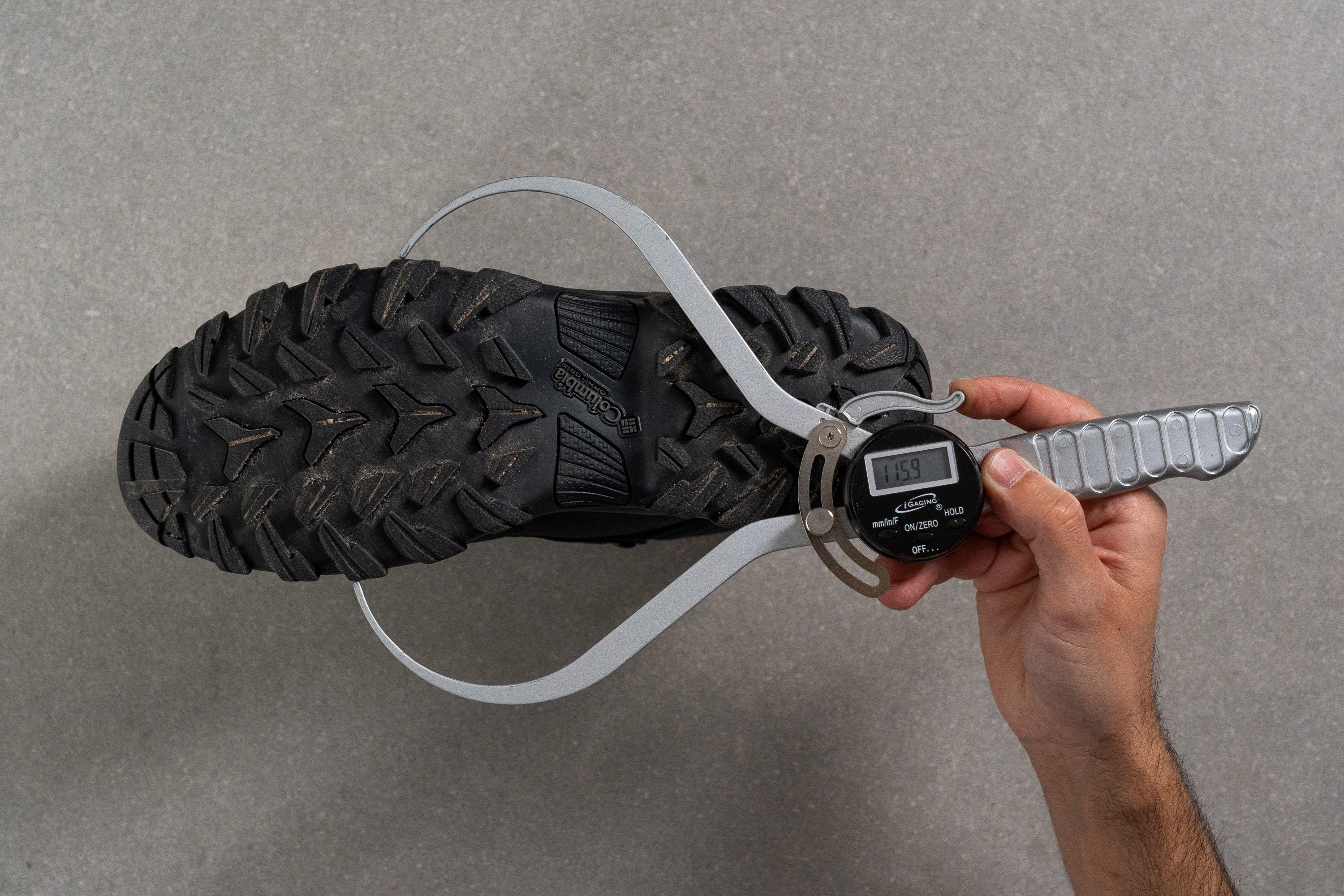
| Newton Ridge Plus II Waterproof | 115.9 mm |
| Average | 111.5 mm |
Midsole width - heel
The heel of the Newton Ridge turned out to be equally wide with 88.5 mm in the widest area. It gave us a pretty solid footing without feeling too platformy.
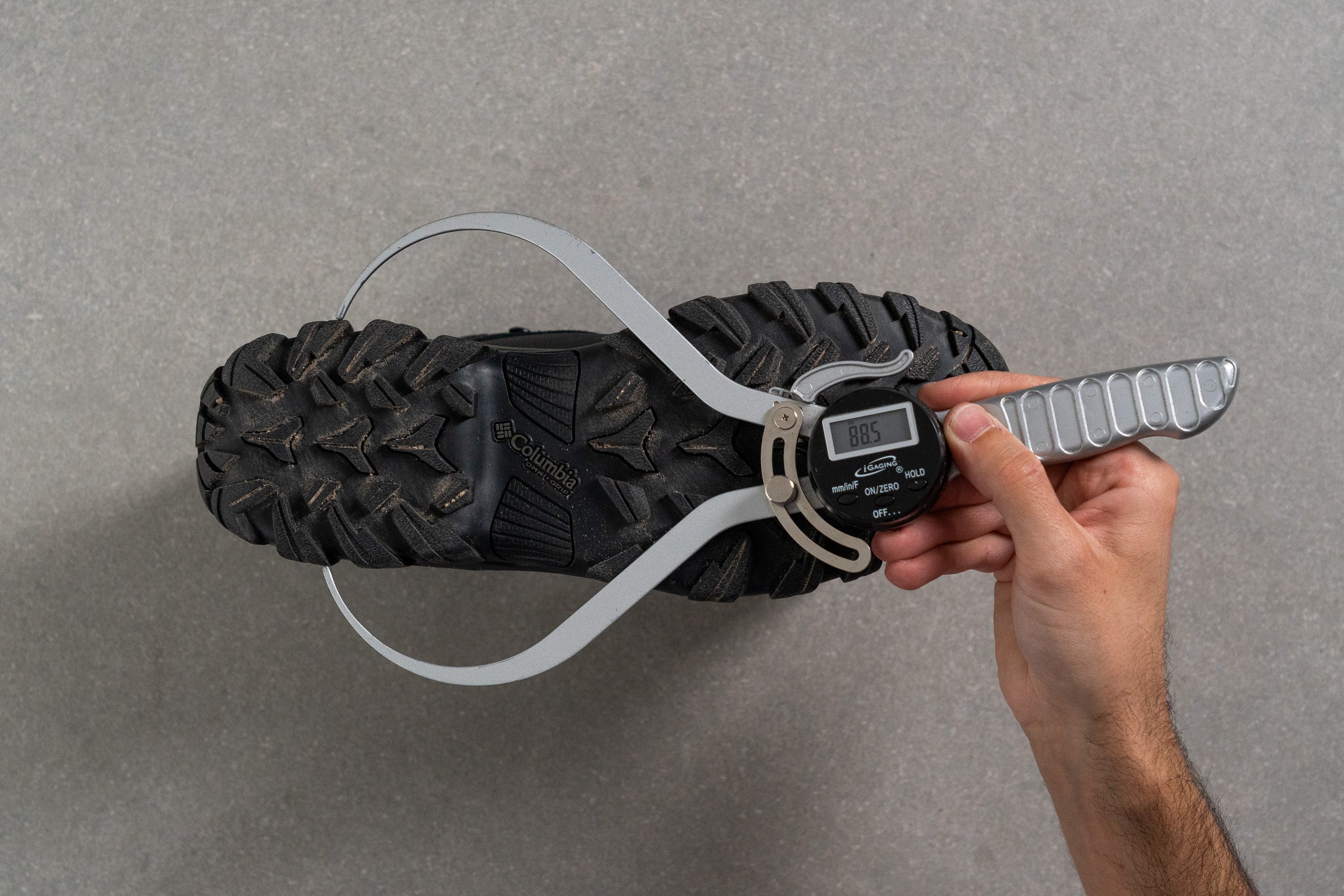
| Newton Ridge Plus II Waterproof | 88.5 mm |
| Average | 87.6 mm |
Durability
Toebox durability
The most high-wear areas of the boot are covered in PU leather. Even though it's not a top-grade type of leather, it proved to be more resistant to sharp bushes and rocks than textile or mesh.
In our abrasive durability test, we applied a Dremel with a sandpaper tip to the top of the boot's toebox at 5K RPM speed. After 12 seconds of drilling, the material showed very minor damage - the tool burned through the topmost PU layer without affecting the boot's integrity. Because of that we gave the Newton Ridge a high score for toebox durability - 4 out of 5!
On the downside, this type of leather is prone to discoloration and creases which makes it less aesthetically pleasing with time.
| Newton Ridge Plus II Waterproof | 4 |
| Average | 4.3 |
Heel padding durability
The durability of inner lining is just as important as the exterior resilience if you want to experience a comfortable step-in feel for as long as possible. Because once that lining is torn, hot spots and blisters are just around the corner.
Unfortunately, we saw some significant wear and tear after applying our Dremel to the inner side of the Newton Ridge's collar for only 4 seconds. Assessing the damage, we couldn't rate the boot's heel padding durability with a below-average score of 3. Not much life expectancy here.
| Newton Ridge Plus II Waterproof | 3 |
| Average | 3.6 |
Outsole hardness
The rubber blend of this Columbia boot turned out to be slightly softer than average with a durometer readig of 84.0 HC.
Softer rubbers tend to feel tackier on wet rocks and boulders but on the flip side, they are more prone to wearing off (as our next test confirms).
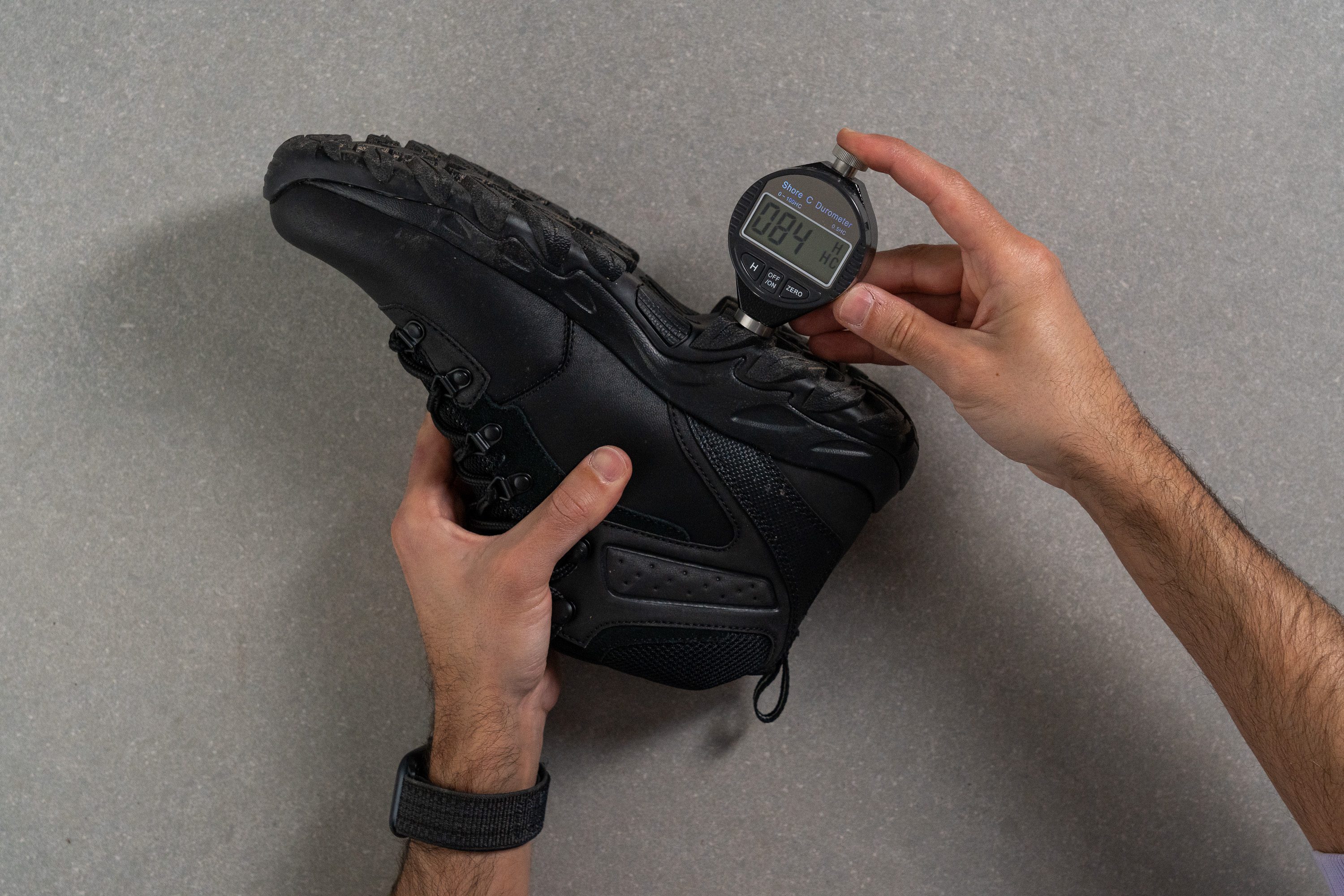
| Newton Ridge Plus II Waterproof | 84.0 HC |
| Average | 87.1 HC |
Outsole durability
Considering the lower price point of the Columbia Newton Ridge Plus II WP, we kept our expectations low in the durability department.
That's why we weren't surprised to see how effortlessly the sandpaper bit into the boot's outsole rubber leaving a deeper-than-average dent of 1.3 mm.
| Newton Ridge Plus II Waterproof | 1.3 mm |
| Average | 0.8 mm |
Outsole thickness
It's good to see that the boot packs a very thick layer of rubber (3.7 mm) to extend its shelf life.
However, we would recommend staying away from concrete roads and rock-heavy trails if you want to get as much use out of this Columbia boot as possible.
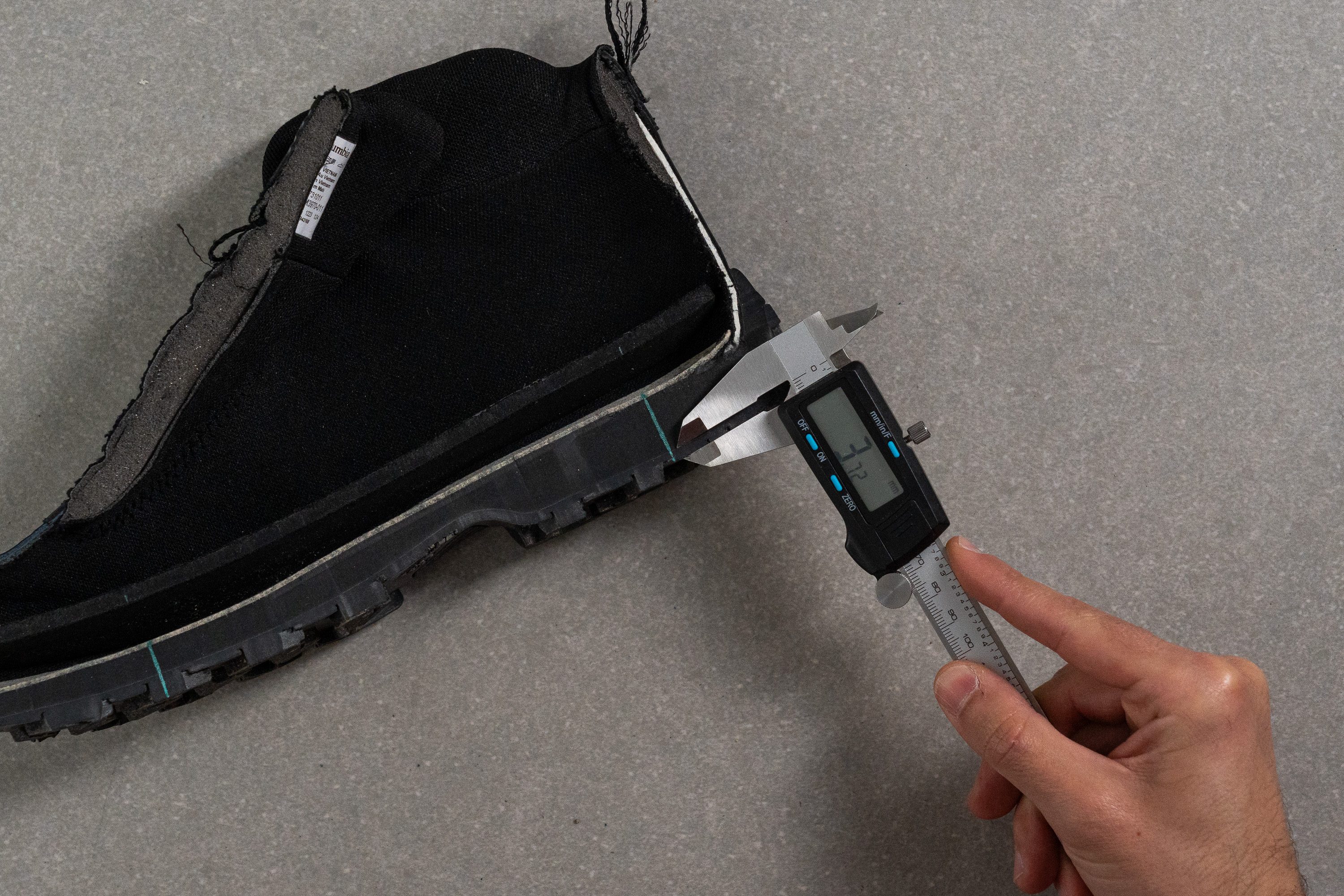
| Newton Ridge Plus II Waterproof | 3.7 mm |
| Average | 2.9 mm |
Misc
Insole thickness
As a budget-friendly boot, the Newton Ridge uses a basic, moderately-padded foam insole. Measuring its thickness in the heel, our caliper showed 5.5 mm which is standard for a hiking boot.
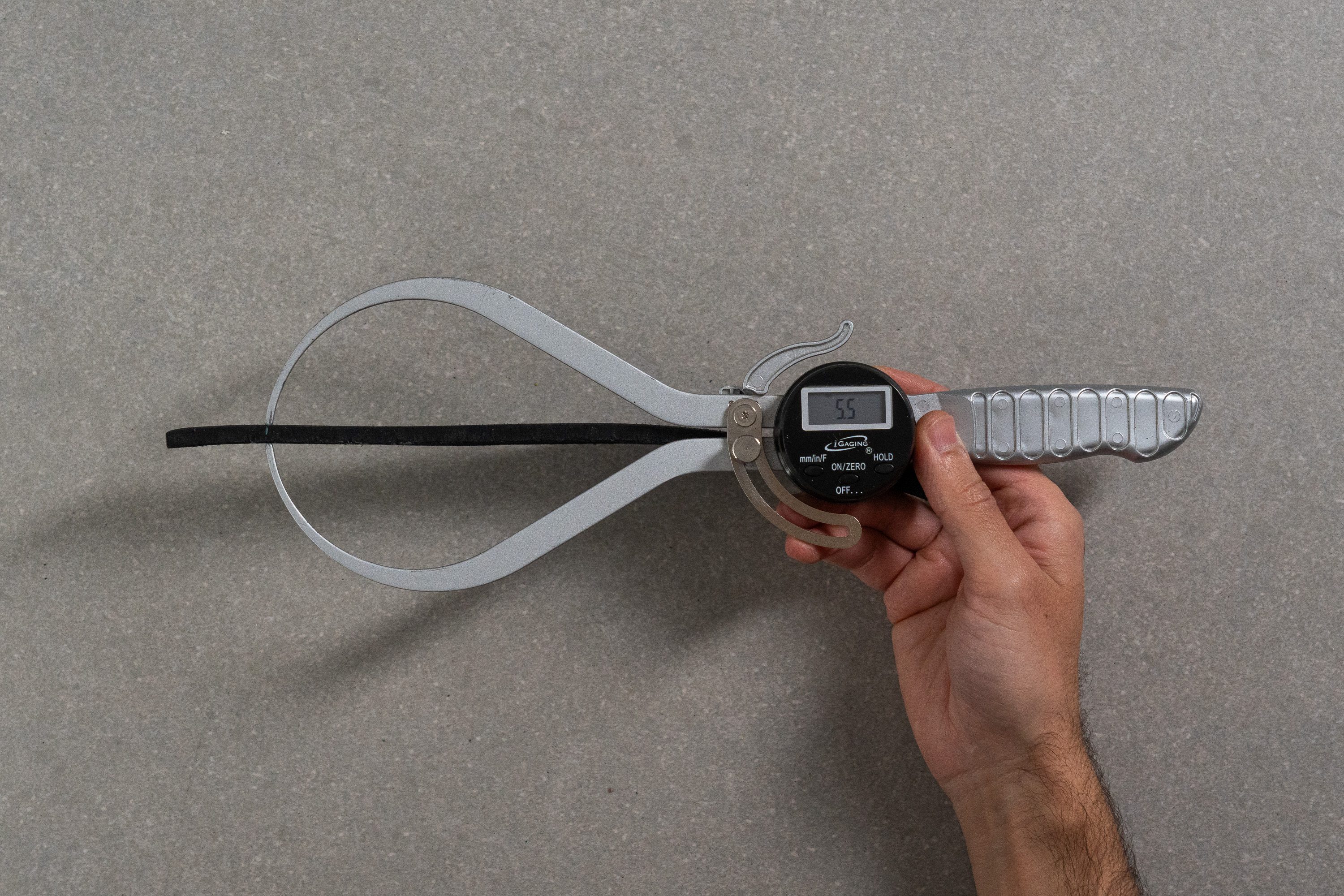
| Newton Ridge Plus II Waterproof | 5.5 mm |
| Average | 6.0 mm |
Removable insole
The insole of the Newton Ridge is easily removable in case you want to swap it for a custom orthotic.
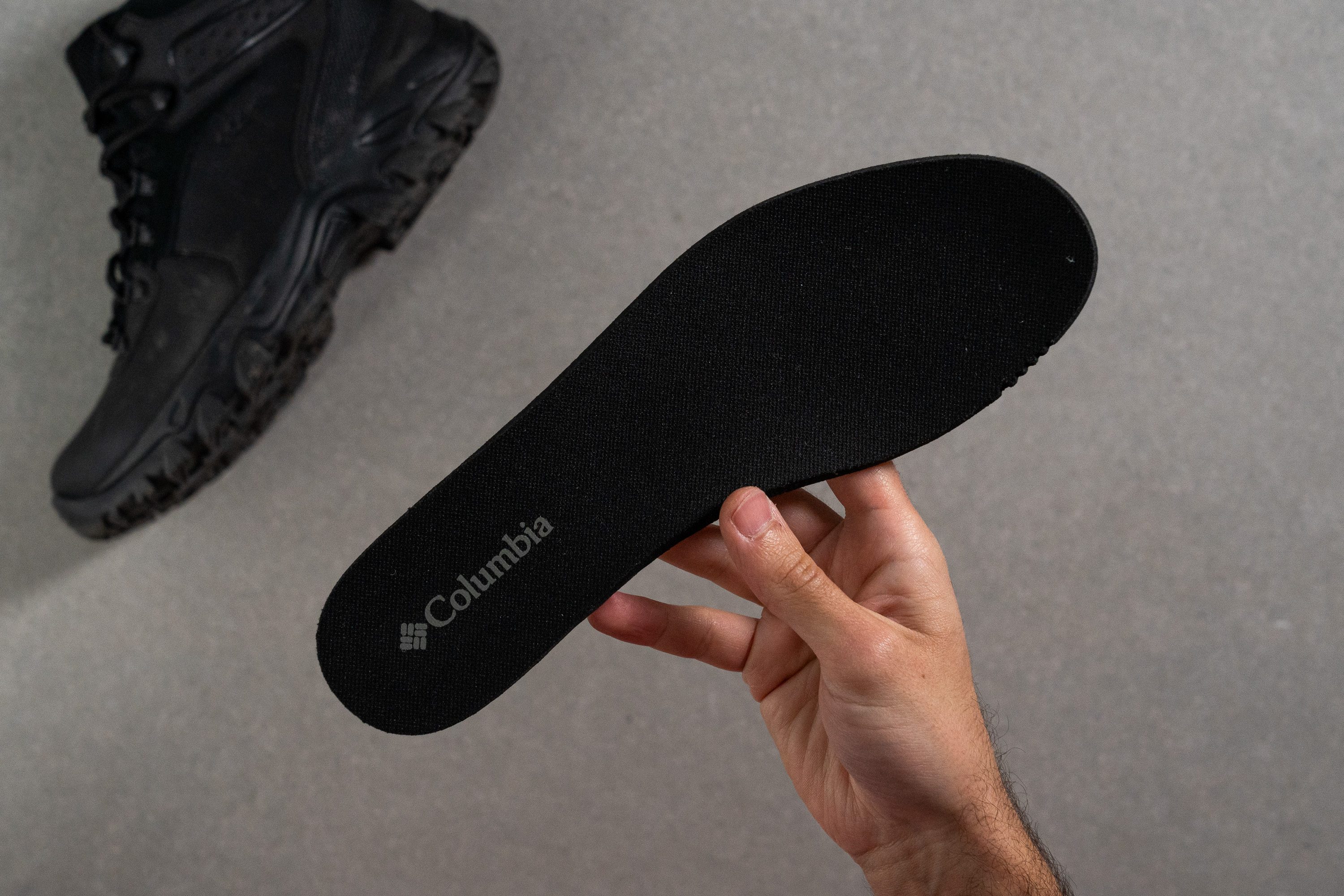
| Newton Ridge Plus II Waterproof | Yes |
Midsole softness in cold (%)
And if you intend to wear this Columbia boot in low temperatures, be prepared for an even firmer ride.
Our lab tests showed that the Techlite foam lost 22% of its softness after spending 20 minutes in the freezer.
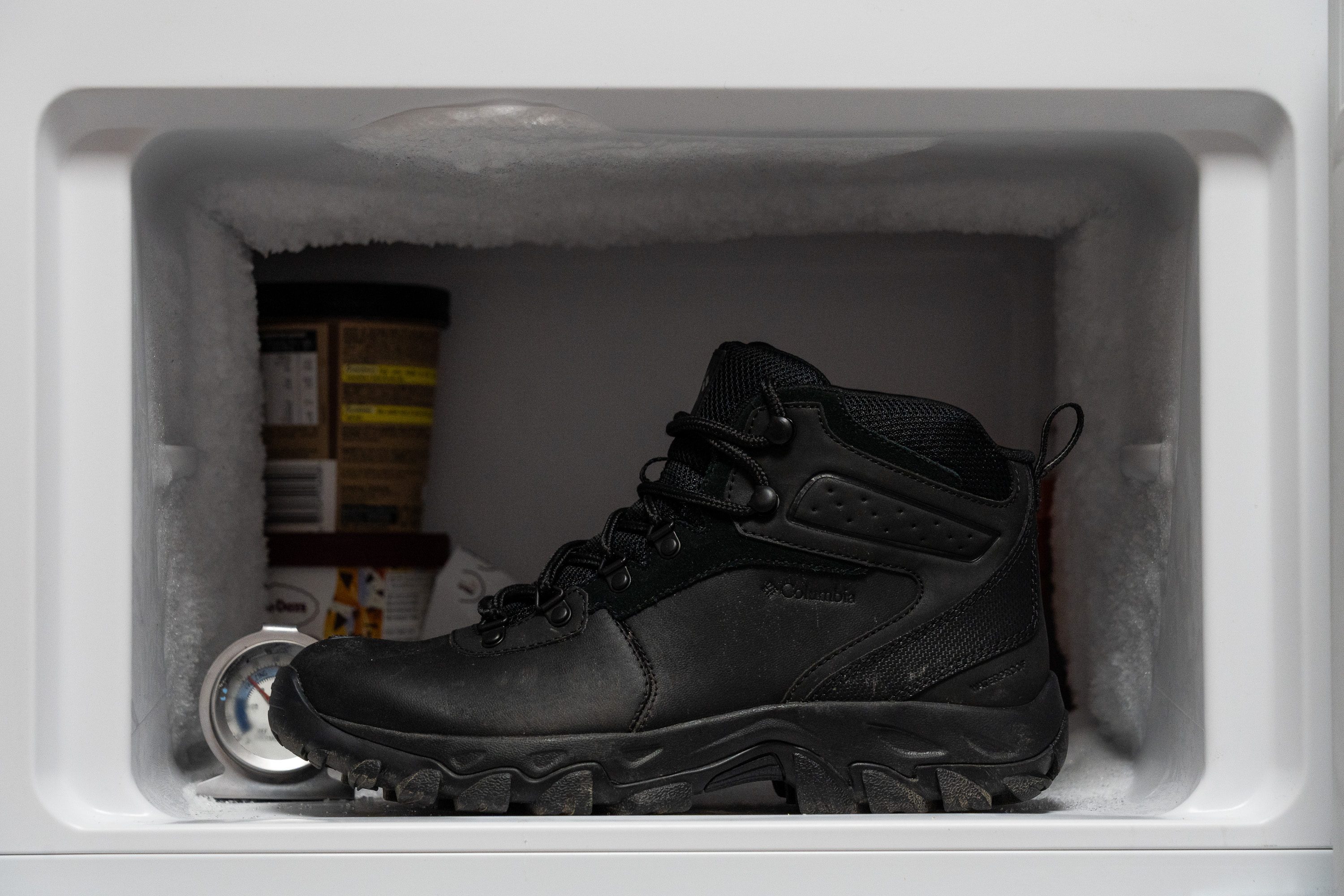
| Newton Ridge Plus II Waterproof | 22% |
| Average | 20% |
Reflective elements
There are no reflective elements on this Columbia boot.
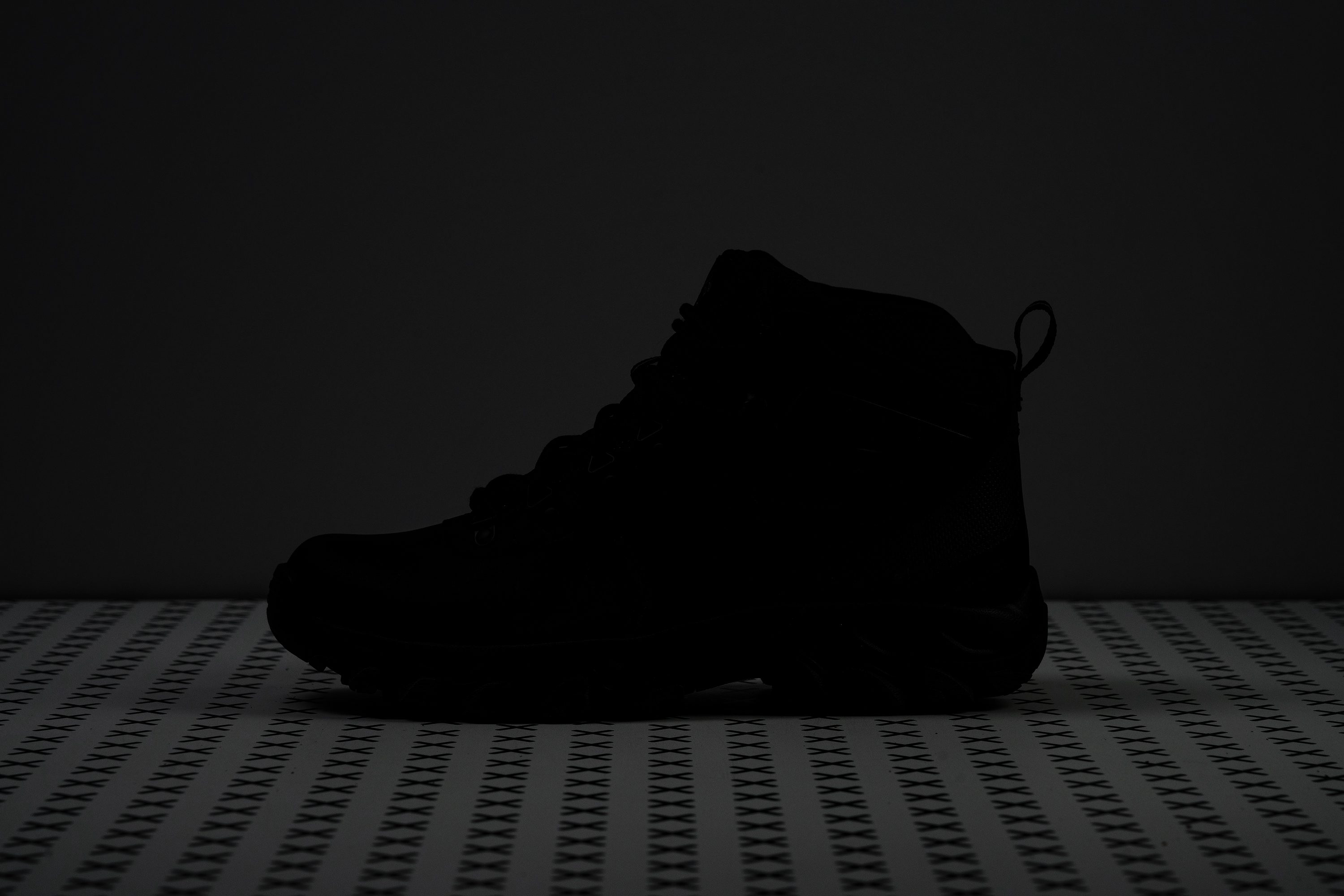
| Newton Ridge Plus II Waterproof | No |
Tongue padding
The Newton Ridge doesn't have much padding around the collar but it packs a generous amount of foam in its tongue. Our caliper recorded an above-average tongue thickness of 14.7 mm!
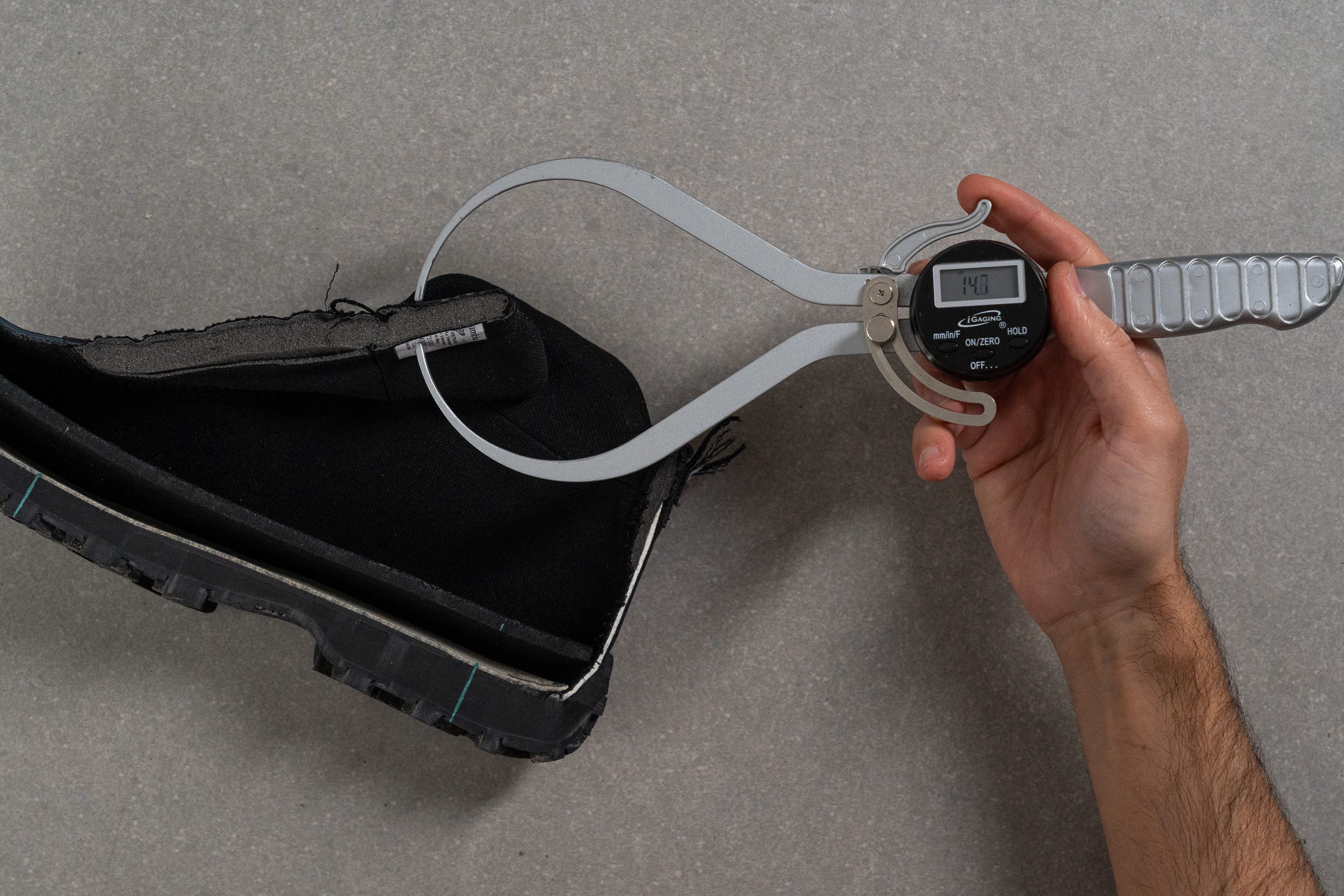
| Newton Ridge Plus II Waterproof | 14.7 mm |
| Average | 11.2 mm |
Tongue: gusset type
The boot has a fully-gusseted tongue which contributes to waterproofing and prevents small debris from getting inside the boot.

| Newton Ridge Plus II Waterproof | Both sides (full) |
Heel tab
A fabric finger loop is placed at the back to help with the on-and-off. However, it feels a little too frail.
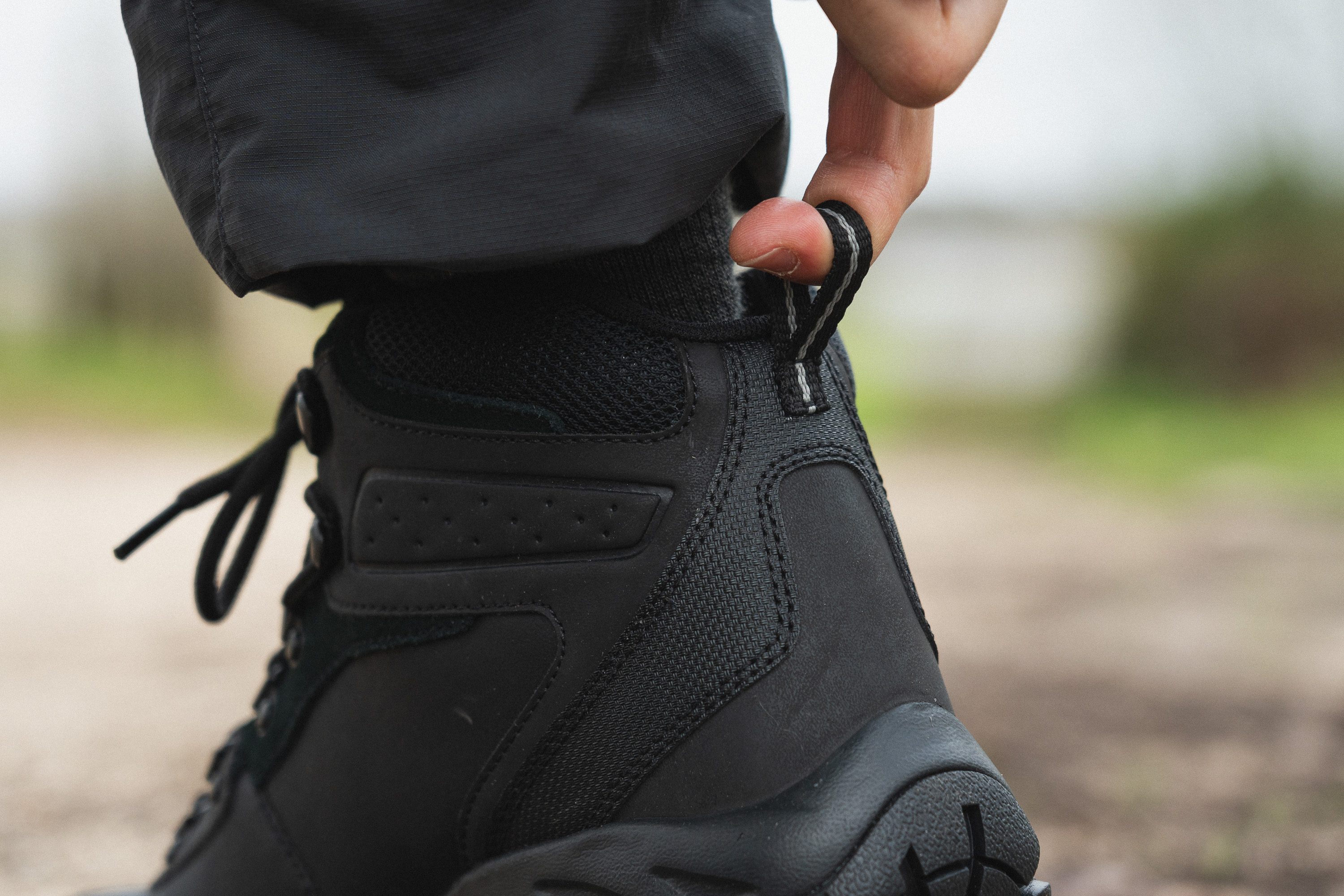
| Newton Ridge Plus II Waterproof | Finger loop |
Price
The Newton Ridge Plus II WP is a budget-friendly boot from Columbia that offers excellent value for money. It is an ideal option for recreational hikers who don't need all the newest bells and whistles of technical hiking boots.
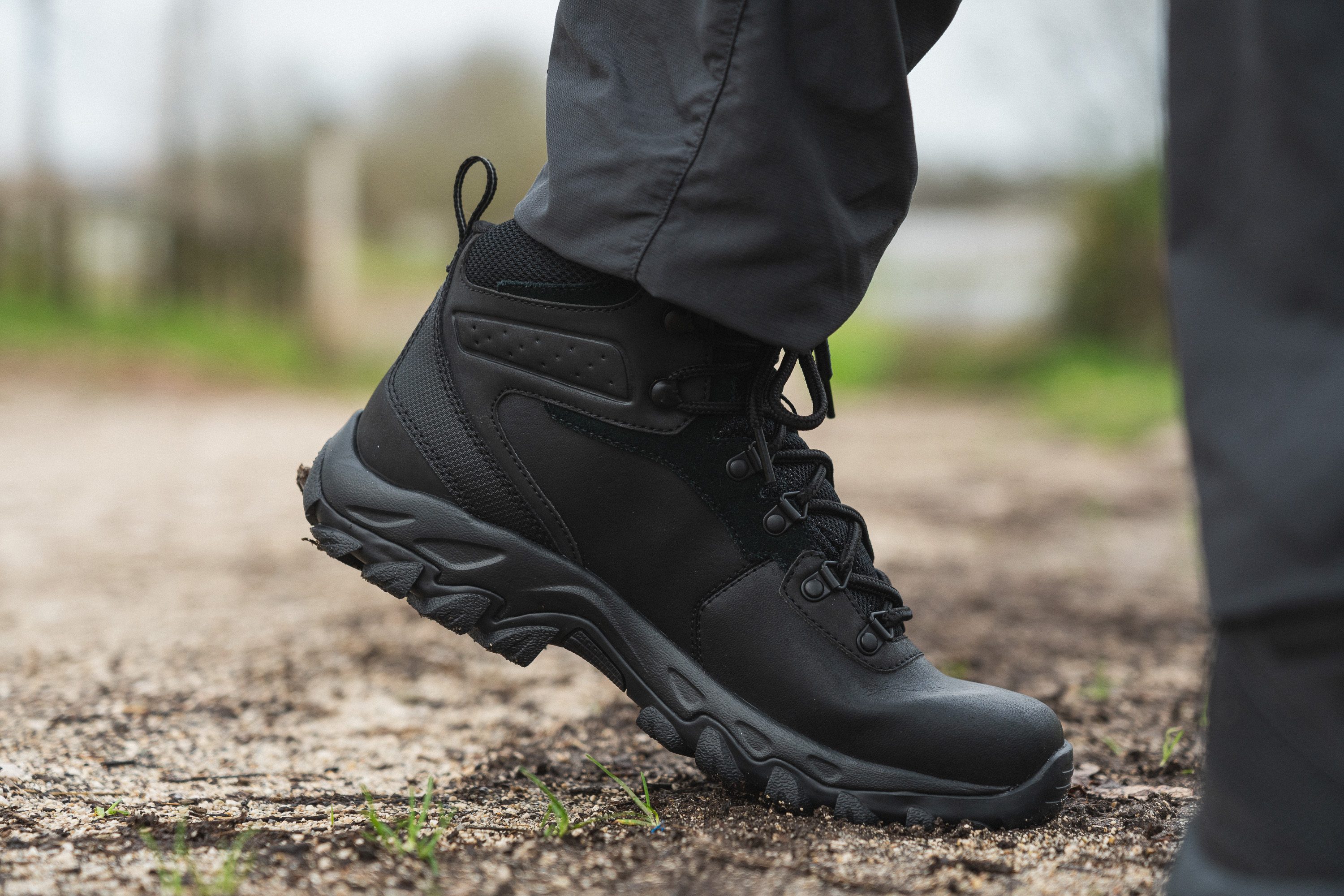
| Newton Ridge Plus II Waterproof | $100 |
| Average | $210 |

